MELSA Newsletter
◆Dear MELSA Cafe members◆[MELSA Cafe monthly reports]
[2024- April report]
The online class "Pharmaceutical English in practical use" ended at the end of March.
Thank you very much for your participation for two years from 2022.
We look forward to meeting you at the on-site lectures soon.
[2024- March report]
☆Summary of the final lesson: "Pharmaceutical English in practical use"
・March 21, 2024 (slides extracted)
20240321_March_Pharmaceutical_English.pdf へのリンク
[2024- February report]
☆Summary of the lesson: "Pharmaceutical English in practical use"
・February 15, 2024 (slides extracted)
20240215_February_Pharmaceutical_English_rev.pdf へのリンク
[2024- January report]
☆Summary of the previous lessons: "Pharmaceutical English in practical use"
・January 18, 2024 (slides extracted)
20240118_January_Pharmaceutical_English_rev.pdf へのリンク
・December 21, 2023 (slides extracted)
20231221_December_Pharmaceutical_English_rev.pdf へのリンク
[2023-November report]
The 60th Annual Meeting of the Japanese Society of Pediatric Allergy and Clinical Immunology was held on November 18 and 19, 2023, at Miyako Messe, Kyoto, Japan. Omori attended the meeting online as usual.
The greetings by Congress president, Yusei Ohshimais are as follows:
[extracted from the program online]
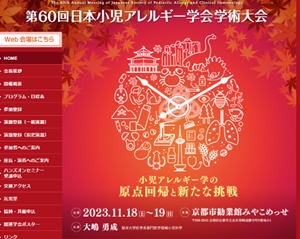
[Greetings]
Dear friends and colleagues,
The 60th Annual Meeting of the Japanese Society of Pediatric Allergy and Clinical Immunology will be held on November 18 and 19, 2023, at Miyako Messe, Kyoto, Japan, with the theme “Returning to the basics of pediatric allergology and new challenges."
This year marks the 60th gathering of the Japanese Society of Pediatric Allergy and Clinical Immunology since its first meeting in 1966. During this period, there have been great advances in the management of allergic diseases due to innovations in allergology and clinical immunology, the development of new therapeutic agents, and the spread of guidelines. However, we have not yet established how to prevent and cure allergic diseases. In this meeting, we would like to discuss how allergic diseases should be prevented, treated, and managed from the viewpoints of allergology and clinical immunology in order to make progress in pediatric allergology.
The 60th Annual Meeting of the Japanese Society of Pediatric Allergy and Clinical Immunology will be held on November 18 and 19, 2023, at Miyako Messe, Kyoto, Japan, with the theme “Returning to the basics of pediatric allergology and new challenges."
This year marks the 60th gathering of the Japanese Society of Pediatric Allergy and Clinical Immunology since its first meeting in 1966. During this period, there have been great advances in the management of allergic diseases due to innovations in allergology and clinical immunology, the development of new therapeutic agents, and the spread of guidelines. However, we have not yet established how to prevent and cure allergic diseases. In this meeting, we would like to discuss how allergic diseases should be prevented, treated, and managed from the viewpoints of allergology and clinical immunology in order to make progress in pediatric allergology.
Due to the Coronavirus pandemic, the past three conferences have been held either online or in a hybrid format with online and onsite delivery. While online meetings are easier to attend, they are less conducive to face-to-face discussions. At the 60th meeting, we would like to return to the original format of the conference and hold active discussions as we did during the pandemic We are also planning to prepare on-demand delivery of the program so that those who are unable to attend can view the program at a later date.
We look forward to seeing many participants in Kyoto in November 2023.
Sincerely yours,
/////////////////////////////////////////////////////////////////////////////////////////
☆Summary of the lesson: "Pharmaceutical English in practical use"
・November 16, 2023 (slides extracted)
20231116_November_Pharmaceutical_English_rev.pdf へのリンク
[2023-October report]
☆Summary of the lesson: "Pharmaceutical English in practical use"
・October 19, 2023 (slides extracted)
20231019_October_Pharmaceutical_English_rev.pdf へのリンク
[2023-September report]
☆Summary of the previous lessons: "Pharmaceutical English in practical use"
・September, 2023 (slides extracted)
20230921_September_Pharmaceutical_English_rev.pdf へのリンク
・August, 2023 (slides extracted)
20230817_August_Pharmaceutical_English_rev.pdf へのリンク
[2023-August report]
☆Summary of the previous lessons: "Pharmaceutical English in practical use"
・July, 2023 (slides extracted)
20230720_July_Pharmaceutical_English_rev.pdf へのリンク
・June, 2023 (slides extracted)
20230615_June_Pharmaceutical_English_rev.pdf へのリンク
・May 2023 (slides extracted)
20230518_May_Pharmaceutical_English_rev.pdf へのリンク
[2023-May report (1)]
☆About [Study Group: MELSA Cafe @Shimbashi]
・The 2023 on-site (off-line) lesson at Shimbashi Baloon will be held once a month on the 4th (or 3rd) Wednesday, 15:00-16:20 (80 minutes).
・ For the lesson,the textbook 4 "Can you say 'Take care of yourself' in English? (Medical Times)”.
・In addition to reviewing medical English vocabulary and practicing role-playing of conversation sentences, it is a more interactive participation type lesson, such as holding discussions in small groups.
・Referring to the case study conversation sentences in the textbook, other role-playing exercises will be conducted using improved conversation sentence examples so that better communication can be established with patients in a hospital or clinic.
・Using the latter half of the lesson for about 20 minutes, we try to read interesting topics related to medical/healthcare fields in English.
・A wide vocabulary of medical English we have learned in MELSA lessons will frequently appear.
Would you like to join us for a review?
[2023-May report (2)]
The 21st Annual Meeting of the Japan Society of Travel Medicine
Date: May 20-21, 2023
The theme of the conference is “The Basics and Future of Travel Medicine!”
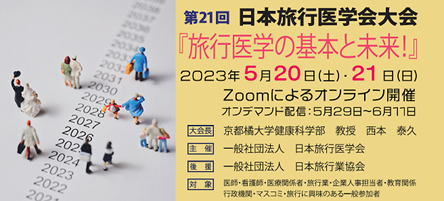
[Introducing one of the presentations]
"What it takes to internationalize your hospital ~Filling the 'holes' in medical care for foreigners~"
NTT East Kanto Hospital, Ryuichiro Sasae, Director, International Medical Department
[Abstract of Lecture] This time, I would like to share these issues based on my experience in setting up an international medicine department at NTT East Kanto Hospital, a British GP. In Japan, coexistence with corona is progressing, and the number of foreign patients has begun to increase rapidly. On the other hand, Japan is facing a rapidly aging population with a declining birthrate. From a long-term perspective, securing foreign workers, especially highly-skilled workers, is the way to remain a major country. Under such circumstances, it is desirable to build a medical environment in which foreign patients can receive medical care safely and securely. Now, I would like to consider how hospitals and clinics should respond to the increasing number of foreign patients.
[2023-May report (3)]
Seminar information: Tokyo & Osaka
“Thinking about infectious disease prevention from the title “Mushi Care”
Tokyo held: Date and time 2023/5/28 (Sun) 13:00 to 15:00
Venue Yurakucho Asahi Hall Yurakucho Mullion 11F
Thinking about infectious disease prevention from "insect care"
Part 1: Lectures by specialists
A--《Right now, the world of insects is in serious trouble ~Risks of infectious diseases caused by global environmental changes》
by Professor Koichi Goka, Ecologists working to conserve biodiversity:
National Institute for Environmental Studies Ecological risk assessment and countermeasures
Laboratory Head / Conservation Ecologist
B--《Protect yourself from infectious diseases transmitted by mosquitoes and ticks!》 》
by Professor Satoshi Kutsuna, International infectious disease specialist,
Department of Infection Control, Graduate School of Medicine, Osaka University
[2023-April report]
☆Summary of the previous lessons: "Pharmaceutical English in practical use"
・April, 2023 (some slides extracted)
20230420_Pharmaceutical_English_slides.pdf へのリンク
・March, 2023 (some slides extracted)
20230322_March_Pharmaceutical_English.pdf へのリンク
・February, 2023 (some slides extracted)
20230216_Pharmaceutical_English_slides.pdf へのリンク
[2023-January report]
We held three kinds of online study sessions as usual;
"Continuing" session with textbook ② on 1/12 (Thu) at 20:00-21:30 (by Mr. Kazunori Shishikura) , "Pharmaceutical English in practical use" session with textbook ③ on 1/19 (Thu) at 10:00-11:30 (by Ms. Atsuko Omori), and "Basic" session with textbook ① on 1/19 (Thu) at 14:30-16:00 (by Mr. Kazunori Shishikura) .
☆Summary of the previous lessons: "Pharmaceutical English in practical use"
・January, 2023 (some slides extracted)
2023_January_Pharmaceutical_English.pdf へのリンク
・December, 2022 (some slides extracted)
2022_December_Pharmaceutical_English.pdf へのリンク
・November, 2022 (some slides extracted)
2022_November_Pharmaceutical_English.pdf へのリンク
・October, 2022 (some slides extracted)
2022_October_Pharmaceutical_English.pdf へのリンク
[2022-September report]
[Study Group: MELSA Cafe in 2022]
We held three kinds of online study sessions as usual.
"Continuing" session with textbook ② on 9/8 (Thu) at 20:00-21:30, "Pharmaceutical English in practical use" session with textbook ③ on 9/15 (Thu) at 10:00-11:30, and "Basic" session with textbook ① on 9/15 (Thu) at 14:30-16:00.
In addition, an online “trial lesson” (by Mr. Kazunori Shishikura) was held on 9/13 (Tue) at 20: 00-21: 30 . Two participants joined us.
"Pharmaceutical English in practical use" session also included a "trial lesson" on the same day, 9/15 (by Ms. Atsuko Omori & Ms. Jane Hsieh). Two participants also joined us.
Information on the 7th “CReSS” Medical Writing Seminar (Webinar)
Mr. Kazunori Shishikura( MELSA lecturer) and Ms. Atsuko Omori (MELSA Representative Director) participated in the 7th “CReSS” Medical Writing Seminar on September 11th (Sun).
The Japanese Society of Pediatric Allergy has held a Clinical Research Seminar (CReSS) to support the research activities of its members. Also, the CReSS Medical Writing Seminar has been planned and held for the purpose of learning how to present one's own research as English academic papers to the world.
In addition to the well-received lectures on international writing guidelines and tips for writing papers in English, this 7th edition featured a lecture on biostatistics by a new lecturer.
[2022-August report]
[Study Group: MELSA Cafe in 2022]
We held three kinds of online study sessions as follows;
"Continuing" textbook ② on 8/11 (Thu), "Pharmaceutical English in practical use" textbook ③ on 8/18 (Thu), and "Basic" textbook ① on 8/25 (Thu).
・In the listening part of Dialogue, a pre-recorded voice of Ms. Jane was be played.
・This month, the Shadowing/Overlapping, Role-Playing, and Reading with Ms. Jane were not practiced. ・・・・Alternative exercise was English composition using dialogues in the textbook. See below for details.
20220818_August_Pharmaceutical_English.pdf へのリンク
・From 11:30 to11:50 (about 15-20 minutes), MELSA Vice Director Kuniko Otsuka (Yokohama University of Pharmacy, Visiting Professor) provides some additional information related to medications that we monthly learn in our lesson “Pharmaceutical English in practical use”.
It is not included in recording of "Pharmaceutical English in practical use" (10:00-11:30).
However, MELSA participants who are interested in it can remain in the zoom meeting room and listen to her live lecture. This month's topic is Allegra. See below for details.
20220818_medical_information_Allegra_Tablets.pdf へのリンク
☆Notice of Cancellation
・Due to the rapid increase in the number of COVID-19 cases nationwide, the August "Off-line Meeting" and the Summer Vacation Special Trial Session "Kenko to Eigo (Health & English)" (by Kazunori SHISHIKURA sensei), which were scheduled to be held at the local venue (Balloon), have been canceled.
・The September Online Trial Session (Zoom) will be held as scheduled.
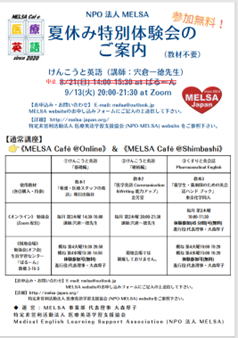
[2022-July report]
[Study Group: MELSA Cafe in 2022]
Online study sessions, "Continuing" textbook ②, "Pharmaceutical English in practical use" textbook ③, and "Basic" textbook ① were held on 7/14 (Thursday) night, 7/21 (Thursday) morning, and 7/21 (Thursday) afternoon, respectively. The contents partially extracted from the session "Pharmaceutical English in practical use" textbook ③ are as follows;
2022_July_Pharmaceutical_English.pdf へのリンク
[2022-June report]
[Study Group: MELSA Cafe in 2022]
Online study sessions, "Continuing" textbook ②, "Pharmaceutical English in practical use" textbook ③, and "Basic" textbook ① were held on 6/9 (Thursday) night, 6/16 (Thursday) morning, and 6/16 (Thursday) afternoon, respectively. The contents partially extracted from the session "Pharmaceutical English in practical use" textbook ③ are as follows;
20220621-22_MELSA_June_Lesson.pdf へのリンク
[2022-May report]
[Conference participation]
2022/5/21-22 The 20th Annual Meeting of the Japane Society of Travel Medicine
《International student travel medicine part 2 “Protect your life and body!”》
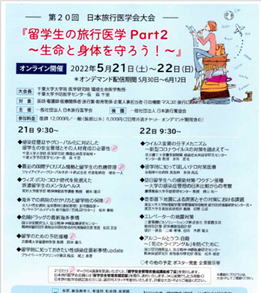
[Study Group: MELSA Cafe in 2022]
We held three kinds of online study sessions as usual.
Online study sessions, "Continuing" textbook ②, "Pharmaceutical English in practical use" textbook ③, and "Basic" textbook ① were held on 5/12 (Thursday) night, 5/19 (Thursday) morning, and 5/19 (Thursday) afternoon, respectively. The contents partially extracted from the session "Pharmaceutical English in practical use" textbook ③ are as follows;
20220519_May_Lesson_rev.pdf へのリンク
[2022-April report]
[Study Group: MELSA Cafe in 2022]
The 2022 new projects, [Study Group: MELSA Cafe @Online] and [Study Group: MELSA Cafe @Snimbashi] have started. Online study sessions, "Continuing" textbook ②, "Pharmaceutical English in practical use" textbook ③, and "Basic" textbook ① were held on 4/14 (Thursday) night, 4/21 (Thursday) morning, and 4/21 (Thursday) afternoon, respectively. The contents partially extracted from the session"Pharmaceutical English in practical use" textbook ③ are as follows;
20220421_April_Lesson_rev.pdf へのリンク
///////////////////////////////////////////////////////////////////////////////
[2021-December report]
[New visions for the Study Group MELSA Cafe in 2022]
In 2021, all study sessions were canceled from April to the end of September. Also, we announced that we had to consider appropriately the spread of COVID-19 in each region. However, nowadays, following the "Delta strain", a new mutant virus "Omicron strain" has been confirmed in Japan. The MELSA study sessions will be continuously cancelled. The MELSA Board of Directors is now discussing an "online study session" as an alternative to the "meeting-type face-to-face study session" for the next fiscal year. We will inform you as soon as the details are determined. Thank you for your understanding. (December 1st, 2021)
[2021-September report]
[The 83rd Annual Meeting of the Japanese Society of Hematology]
Initially, it was planned to be held at the Sendai International Center, but since the summer, the number of people infected with the new coronavirus infection (COVID-19) has increased rapidly. Eventually, it was changed to a full web event.
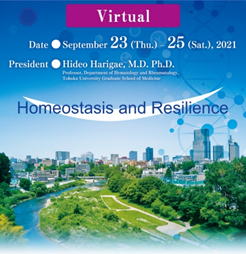 【the program (simplified version)】
【the program (simplified version)】While attending graduate school, I (Omori) was involved in research on hematopoietic stem cells in umbilical cord blood. Since then, I have participated in academic meetings of the Japanese Society of Hematology every year. This time as well, the program (simplified version) was sent in advance.
I was very impressed with the following greeting from the president of the convention. This year's academic conference will be held in Sendai, and it will be held in the midst of the spread of coronavirus infection, for which there is still no prospect of convergence. I will introduce his greetings here.
...........................................................................................................................................................
[Greetings: Hideo Harigae, M.D. Ph.D.]
(Professor, Department of Hematology and Rheumatology,
Tohoku University Graduate School of Medicine)
We are pleased to announce that the 83rd Annual Meeting of the Japanese Society of Hematology will be held in Sendai, Japan, from Thursday, September 23 to Saturday, September 25, 2021. This will be the first time for JSH to hold the meeting in Sendai City. I would like to make every effort for the success of this congress.
Blood cells, which have a beautiful and delicate differentiation process from stem cells to mature cells, are essential ones that play a fundamental role in homeostasis, such as oxygen delivery, protection against infection, and hemostasis. Hematological disorders are defined as the conditions deviating from normal differentiation process and losing the homeostasis.
In hematology, the analytical methods have evolved ahead of other fields, from morphology to molecular biology, and the achievements have led to the development of new treatments such as chemotherapy, molecularly targeted therapies and even cell therapies. These therapies certainly cure hematological disorders, but the main power, which cures the diseases, is the resilience of hematopoiesis itself.
The main theme of the conference is thus "Homeostasis and Resilience", which is the essence of hematology.
In addition, this theme reflects another thought of mine. Ten years ago, in 2011, the Great East Japan Earthquake and Tsunami devastated the Tohoku region of Japan and destroyed the social homeostasis in this country. After a while, in 2020, all homeostasis vanished away from over the globe due to COVID-19 infection. Just as Japan has regained homeostasis through its resilience 10 years after the Great East Japan Earthquake, I believe and hope that the resilience of the society will once again restore the homeostasis of life, science, and healthcare by 2021.
Along with this main theme, the congress provides a lot of scientific and informative programs on hematology, from the latest treatments to basic research topics. I believe that you will enjoy the essence of hematology in each of these areas. I am also planning to hold a special symposium about "the social transformation in the post-COVID-19 world".
Lastly, Sendai City in September, the host city, is still a bit early for the autumn leaves, but is a comfortable season. I hope that you will also enjoy the sightseeing of the cities near Sendai City in Tohoku region after the meeting. I look forward to seeing you at the first congress in Sendai City next September.
..........................................................................................................................................
[2021-June report]
[Hokkaido, Yoichi Mode of Vaccination]
I would like to share my COVID vaccination experience with you here in this MELSA Newsletter.
I (Omori) am temporarily living at my parents' house (Yoichi-cho, Hokkaido) to take care of my mother. I’ve already received my own coupon of the new coronavirus vaccination from Yokohama-city, Kanagawa-prefecture because I’m in the elderlies. After completing the application for vaccination outside the residence card location, I was able to get the first vaccination at the large-scale vaccination site in Yoichi-cho.
As some of you may already know, the news contents were posted on the NHK Hokkaido NEWS WEB as follows: “Yoichi-cho, Niki-cho, Furubira-cho, Shakotan-cho, and Akaigawa-mura in Hokkaido are collaborating beyond the boundaries of local governments, such as centralizing reservations and vaccine management.
Until now, individual inoculations by family doctors had been promoted, but from June 5th, large-scale inoculations will start. Residents who made reservations in advance visited the high school in Yoichi-cho, which was the venue. They were divided into four sections and vaccinated, and then followed up to see if there were any serious side reactions.
According to Yoichi-cho municipal government, which is in charge of reservations and vaccine management, the venue is planned to vaccinate about 1,200 people a day, thus about 11,500 elderly people aged 65 and over in four towns and one village will be inoculated by the end of July. It is expected to complete the vaccinations for about 24,900 residents by the end of the year .”
By the way, actually in my case (Omori), the venue was the gymnasium of a private high school in Yoichi-cho. I lined up at the reception desk at 11:00 in the morning, I was vaccinated at around 11:15, and finished at 11:30.
Elderly people to be vaccinated only need to sit in the chair with the designated number until they leave the venue after getting to a reception desk. It is a method in which a nurse sits on a round chair with casters and inoculates one after another while moving in a straight line. It was an efficient way of vaccination, and it was immediately over. It took about 30 minutes from the reception to the exit from the routine, including the follow-up time of side reactions.
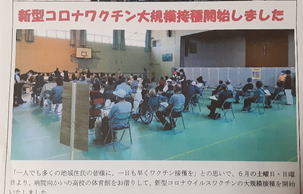
[extracted from the news article of a local hospital in Yoichi-cho]
NHK's national broadcast news also introduced that the flow of vaccination venues in Yoichi is very good, and it seems that local governments other than Hokkaido are also referring to it as a "Yoichi model".
The news and photos of the venue are available to watch in [Vaccination "Yoichi Model" Hokkaido 5 towns and villages cross-border cooperation] June 5, 2021 12:22. If you have time, please refer to NHK WEB News.
[2021-March report]
* The abstract was accepted for the 19th Annual Meetingds of Japanese Society of Teravel Medicine.
・ Title : [Tokyo 2020 Participation Program (Education Field)- certificated MELSA Study Group]
“English Interactive Communication Practice - Medical/Healthcare and Sports/Volunteering -
Changes in the Number of Participants and Questionnaire Analysis (the 2nd survey report)"
・ Online Digital poster presentation: 2021, April, 10-11

[Digital poster (A4, 12 pages)] Title page
[Introduction]
It was on September 7, 2013 when the International Olympic Committee (IOC) decided "Tokyo 2020 Games" would be held in 2020. Coincidentally, MELSA was established as a voluntary organization in June, 2013.
A bland new study session of "English interactive communication practice in medical/healthcare field" was started in September 2013. Then, MELSA was approved as an NPO by the Tokyo Metropolitan Government in October, 2014. A study session of "English interactive communication of Sports & Volunteering (hereinafter referred to as Spo-Volu English Conversation)" was also started in September, 2015.
In September, 2017, MELSA was certified to act as the "Tokyo 2020 Participation Program (Education Field)" . Then, MELSA conducted a questionnaire survey for three months, analyzed the background of the participants in the study session. After completing the three-month survey, MELSA had the opportunity to make a presentation at the 17th Annual Meeting of the Japanese Society of Travel Medicine (JSTM) (April 2018, Tokyo).
Here in the 19th Annual Meeting of JSTM, MELSA was given the second chance to give a digital poster presentation. MELSA will analyze the relationship between the changes in the number of participants and sports and various factors related to international sports events over seven years from 2013 to 2020.
20210622_MELSA_website_rev_digital_poster.pdf へのリンク
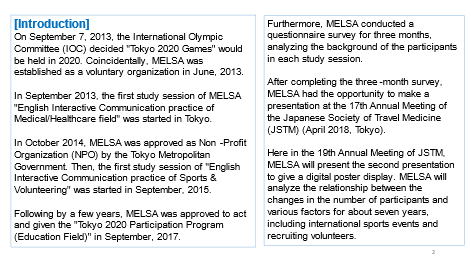
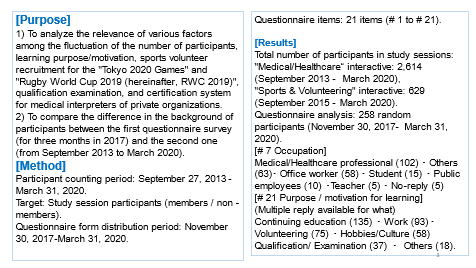
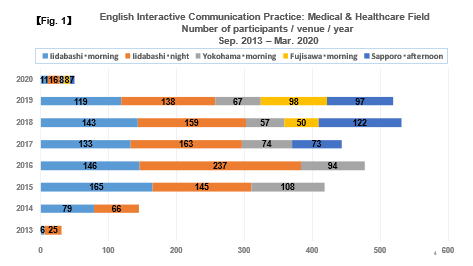
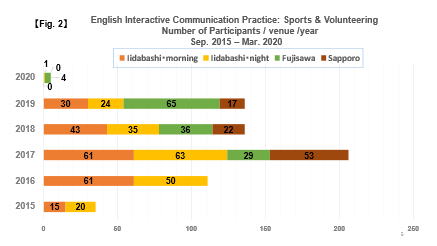
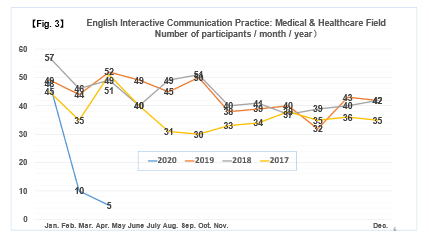
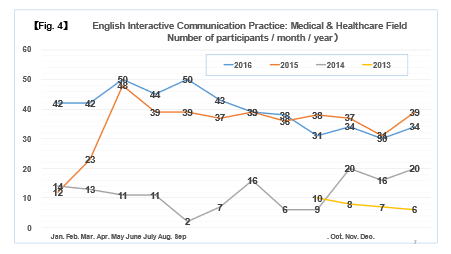
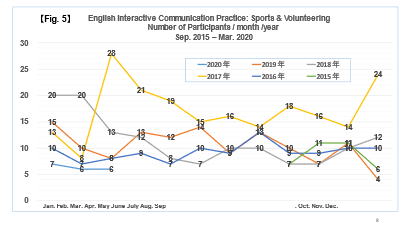
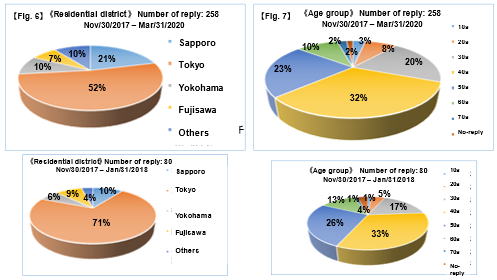
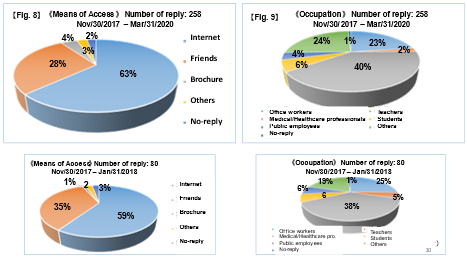
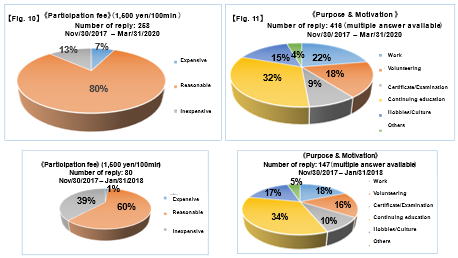
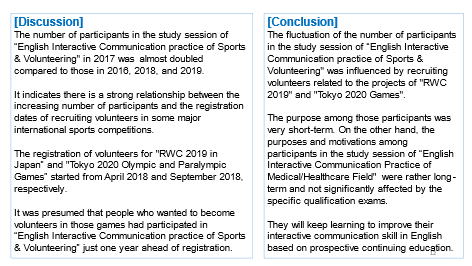
*Letter from YAMANASHI by Tatsuya INOUE (Shiatsu Therapist)
https://www.oketaku.com/eng/
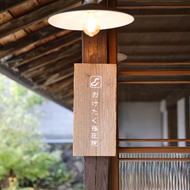
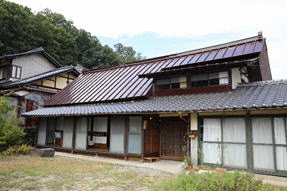
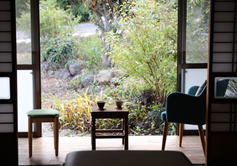
Your mind and body are interconnected. Taking good care of your body has positive effects on your state of mind, your thoughts and feelings and how you relate to people. Let us offer our help to take better care of the body in order to enrich your life and enhance your interactions with others.
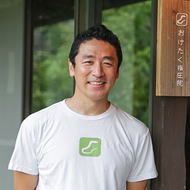 [Tatsuya INOUE]
[Tatsuya INOUE]・Japanese nationally certified shiatsu therapist
・Foeldi style medical lymph drainage therapist
・BRM (Bone Rhythm Movement) therapist
Born in Nagano pref. Japan. B.A in English literature. Studied one year in U.K. Worked in companies as computer system engineer and accountant in Tokyo. Graduated from Japan Shiatsu College.
Opened shiatsu clinic in Tokyo. Moved to Yamanashi pref. and providing shiatsu sessions in an old Japanese folk house and at various events.
[2020-Decembe report]
☆ Recent report from her lectures in"Yokohama College of Pharmacy"
Ms. Otsuka sent us some of slides from her lectures in college.
[Kuniko OTSUKA Ph.D. Associate Professor]
-Yokohama College of Pharmacy, Department of Clinical Pharmacy. -Center for Clinical Pharamacy.
《Excerpt from Dr. Kuniko Otsuka's slid》
20201211_from_OTSUKO_1_ECMO.pptx へのリンク
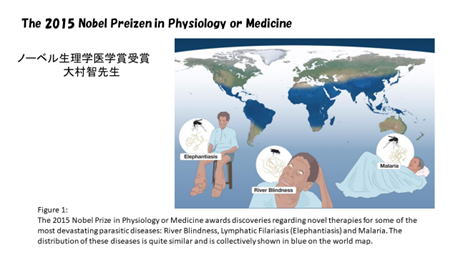
In 2015, Dr. Satoshi Omura was awarded the Nobel Prize in Physiology or Medicine. Ivermectin, also praised as the "wonder drug" for parasitic infections, was developed. Streptomyces avermitilis, a type of actinomycete in soil, was discovered by him in 1979. It has the ability to produce a substance called Avermectin.
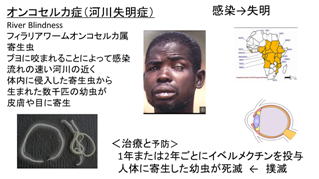
It was found that this substance has the effect of killing nematodes parasitizing mice, and was initially developed as a drug effective against parasite infections in domestic animals such as cattle, and then Ivermectin developed from Avermectin was used for patients in developing countries. It was found that it is also effective against the parasitic infection called river blindness (onchocerciasis, infected by buyo).
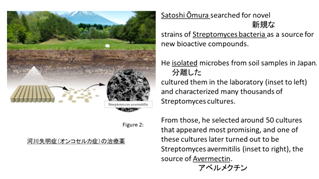
☆In addition, we introduce [YouTube Video] about "Ivermectin & COVID-19".
1) Ivermectin – A Game Changer for COVID-19? “For prevention?”
Christy Ringer, MD
2020/12/23 https://youtu.be/GKpHPrulsaM
Dr. Christy discusses the data on using Ivermectin to prevent COVID-19 infections.
REFERENCES:
Marik Protocol:
https://www.evms.edu/media/evms_publi...
InVitro Ivermectin study:
https://www.ncbi.nlm.nih.gov/pmc/arti...
2) Ivermectin being studied for COVID 19 || COVID Medication Update Today
2020/04/10 https://youtu.be/ec6XslfVSDE
Doctor Mike Hansen
#covid #covid19 #coronavirus
COVID Update Today by Doctor Mike Hansen (YouTube Video Playlist)
https://www.youtube.com/playlist?list...
----- Ivermectin is an FDA approved medication for parasitic infections. Ivermectin is widely available due to its inclusion on the WHO model list of essential medicines. It opens glutamate-sensitive chloride channel currents in helminths, and it is widely believed that this is how it kills certain parasites. Its the drug of choice for the treatment of onchocerciasis and strongyloidiasis. So why might Ivermectin work against COVID. ----
[2020-November report]
☆ Recent report from one of MELSA members
One of MELSA members , Ms. ONO Sumiyo was selected as a volunteer for the Tokyo 2020 Paralympics. Then, she was interviewed when he attended the online training by the Olympic and Paralympic Games Organizing Committee. Her interview article and photograph were introduced on the Tokyo 2020 website. While making use of the English proficiency cultivated in the MELSA study session, she is actively involved in volunteering at international sports competitions and in various international exchange volunteer groups.
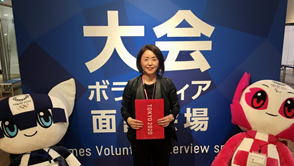
The online training of the Tokyo 2020 Organizing Committee of the Olympic and Paralympic Games was also broadcasted in the English news of NHK WORLD-JAPAN.
NHK_World-Japan_1_img20201030_10055445.pdf へのリンク
After joining MELSA, Ms. ONO attended a study session on "Medical English / English Conversation" and "Sports Volunteer English Conversation" (Tokyo 2020 Participation Program (Education); approval; from October 1th to 2017 - March 31st, 2020) . She was one of the members who participated enthusiastically every month.
Jpn_medical_2020SANKAKU_MELSA_mini-lesson-1-1.pdf へのリンク
Jpn_sports_volunteering_2020SANKAKU_MELSA_mini-lesson-1-1.pdf へのリンク
[2020-October report]
☆October 29th; World Stroke-day Campaign
[extracted from World Stroke Organization] https://www.world-stroke.org/about-wso
Our vision is a world where people live free from the effects of stroke. This vision drives our global effort to improve stroke prevention, treatment, rehabilitation and support.
The World Stroke Organization is the only global body solely focused on stroke. With around 4000 individual and 90 society members spanning every global region, we represent over 55,000 stroke specialists in clinical, research and community settings.
We campaign throughout the year to raise awareness of key issues in stroke prevention, treatment and recovery. Our tools and resources are designed to help members and stakeholders build stroke awareness and advocate for action on the things that matter most.
☆October 15th; Global Handwashing Day
[extracted from HAND HYGIENE FOR ALL] https://globalhandwashing.org/global-handwashing-day/
October 15 is Global Handwashing Day, a global advocacy day dedicated to increasing awareness and understanding about the importance of handwashing with soap as an effective and affordable way to prevent diseases and save lives.
GLOBAL HANDWASHING DAY IS AN OPPORTUNITY TO DESIGN, TEST, AND REPLICATE CREATIVE WAYS TO ENCOURAGE PEOPLE TO WASH THEIR HANDS WITH SOAP AT CRITICAL TIMES.
The COVID-19 pandemic provides a stark reminder that one of the most effective ways to stop the spread of a virus is also one of the simplest: hand hygiene, especially through handwashing with soap. To beat the virus today and ensure better health outcomes beyond the pandemic, handwashing with soap must be a priority now and in the future. This year’s theme, Hand Hygiene for All, calls for all of society to achieve universal hand hygiene.
---the season for reading---
The autumn is the best season for reading in Japan. The Book written by Japanes professors, TORIKAI kumiko and SAITO Yoshifumi, introduces the excellent speeches of Leaders abroad.
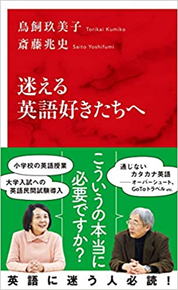
“Great Speeches from Leaders” (Extracted from NHK program in July 3rd, 2020)
① (Queen ElizabethⅡ)
Together we are tackling this disease, and I want to reassure you that if we remain united and resolute, then we will overcome it.
We should take comfort that while we may have more still to endure, better days will return. We will be with our friends again. We will be with our families again.
We will meet again.
② Prime Minister in Canada (Justin Trudeau)
To all the kids out there… all of a sudden, you’ve heard you can’t go on play dates or have sleepovers.
I know this is a big change, but we have to do this not just for ourselves, but for grandparents, our nurses, our doctors and everyone working at our hospitals.
And you kids are helping a lot.
The doctors and scientists have been clear that social distancing, which means staying at least 2 meters apart and staying home as much as possible, is the best way to help each other. So, a special thanks to all you kids.
③ Prime Minister in New Zealand (Jacinda Ardern)
---“New Zealand declares national emergency to tackle outbreak,” Wellington, Reuters, March 26---
New Zealand Prime Minister Jacinda Ardern on Wednesday declared a state of national emergency as the country prepared to go into a complete lockdown at midnight to combat the coronavirus outbreak.
New Zealand’s cases of the coronavirus surged to 205 cases as the government imposed self-isolation for everyone, with all nonessential services, schools and offices to be shut for a month. [...]
“Make no mistake this will get worse before it gets better. We will have a lag and cases will increase for the next week or so. Then we’ll begin to know how successful we have been.”
Ardern told Parliament the lockdown was triggered by early evidence of community transmission of COVID-19, the disease caused by the coronavirus. […]
If you have any questions about what you can or can’t do, apply a simple principle:
Act like you have COVID-19,” Ardern said. Ardern warned the restrictions will be strictly enforced. […]
Cases in neighboring Australia have soared past 2,250 and officials have warned infections could overwhelm medical services.
[2020-September report]
[Extracted from 2020/6/5 2:00 Nihon Keizai Shimbun electronic version]
The Japanese government has begun to focus on overseas public relations regarding strategies for economic resumption. This is because Japan's new coronavirus countermeasures are different in the world, and there is a large gap in recognition with foreign countries, which is considered to be "strange." The center of public relations is the English translation of the Three Cs Avoidance and cluster measures.
"3C (Three Cs = closed spaces, crowded places and close-contact settings)"
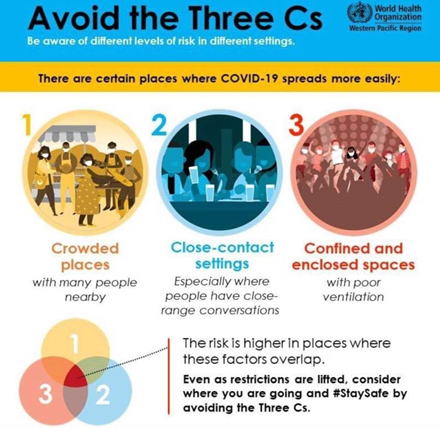
We have to keep in mind again "Japan's Three Cs" in domestic as well as abroad by WHO.
[2020-August report]
◆Keyword [crowd funding (CF)]
A mechanism whereby people and companies who want to collect the funds necessary for business etc. show the target amount of money and the application period on the Internet site and collect an unspecified number of people's money and donations that agree with the purpose. In return for investment, there are "purchase type" where goods and services are provided, and "donation type" where there is no return. A coined word that combines "crowd" and "funding".
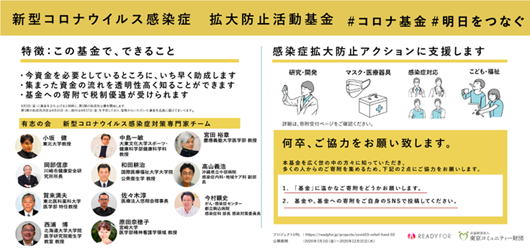
https://readyfor.jp/projects/covid19-relief-fund-02
[Asahi Shimbun Morning Edition] August 11, 2020
Rapid increase in use of CF, support for corona damage, zero commission, 80% "beginner"
Due to the spread of the new coronavirus, the use of crowdfunding (CF)
= keyword =, which collects funds from the unspecified majority on the
Internet, is increasing rapidly. The number of companies that want to raise
funds quickly and the number of sources of funds have increased, and efforts
to expand a wide-ranging of the fund are also supporting the diffusion. Is it a turning point for the
donation culture to take root in Japan?
Established "New Coronavirus Infectious Diseases Expansion Prevention Activity Fund" established by CF major READYFOR to support activities to protect human lives and daily life from corona virus, including medical personnel who fight infectious diseases at the forefront. In the three months since then, donations totaling about 700 million yen have been collected. It exceeded the initial estimate of 100 million yen, and renewed the highest amount in CF history in Japan.
The fund was established on April 3 to support medical staff and vulnerable
groups, and the number of people who made donations exceeded 20,000 in
three months. Nearly 90% are small donations of 10,000 yen or less.
Unlike general CF, this fund is characterized by collecting donations without
limiting the target of subsidies. Ms. Haruka Yonera, the representative
of READYFOR, is pleased that "most of the people donated by CF for
the first time."
Two weeks after the foundation of the fund, the masks and protective clothing were delivered to designated hospitals for infectious diseases, and quick support is also attracting attention. The scope of subsidies has expanded to areas such as support for poor people in daily life, nursing care, and welfare for people with disabilities. To date, 125 cases have been granted, totaling approximately 647 million yen.
The fact that the procedure is completed online and there is no need for face-to-face seems to be a tailwind for the spread under corona.
(Originally written in Jananese by Professional reporter, Hiroaki Kimura
/ Partially extracted and translated into English by MELSA)
[Asahi Shimbun Morning Edition] July 24, 2020
"Prompt support to CF sites" Ken Kosaka, Professor of Tohoku University
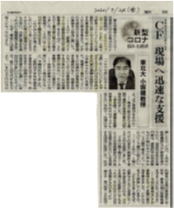
Professor Kosaka (Tohoku University) was interviewed by Asahi Shinbun about
the challenges of crisis management in Japan and the possibility of CF.
He established a fund to support people suffering from corona by collaborating
with crowdfunding (CF) and collecting funds from about 20,000 people.
The interview is as follows;
[Q]――The donations of more than 700 million yen have been collected within 3 months since the launch of the “New Coronavirus Infectious Diseases Spread Prevention Fund” on April 3. The highest amount in domestic CF history.
[A] “I honestly didn't think that so many people would support me. I can
go to volunteers in the disaster-stricken areas, but this time I can't
move and support them. What I can do is I think that there were a lot of
people who not only avoided "3 secrets" but also took a step
further and donated.
Continued from here
[Q] ――90% of donations are less than 10,000 yen. How do you see the expansion of the circle of support?
[A] “I was very surprised that athletes, including pitcher Masahiro Tanaka of the US league, Yankees, donated a large amount of money, and the impact was so great. On the other hand, we have received many donations from people who are having troubles in their lives.Those who have read all the support messages, but who want to do something with little money The value of the donation is very big. I feel nervous that I took a great responsibility." "The greatest mission is to deliver what you need. There is not enough masks that are essential for medical workers who are striving for life. In such a situation, I wanted to help somehow quickly. By April, I was able to deliver the supplies to medical institutions.”
[Q]――The feature of this fund is that the CF became the secretariat and
collected a large amount of donations. How do you evaluate the power of
CF?
[A] “If you use CF well, you can quickly deliver goods and money to where you need it. I feel that it is a necessary mechanism to change Japan in the future.
[Q]――It is said that donation culture is not rooted in Japan. Will this achievement be a turning point to change the Japanese donation culture?
[A] "I think there are many young people who want to help people, and I think they are heading towards a mature society. However, compared to international students, Japanese youth are more concerned about peer pressure. There are many people. I would like to see people who not only donate money but also do new things using CF. It is because of such a sense of blockage that we will change to a society that recognizes diversity I would like to not only provide support to make up for the shortfalls, but also take positive opportunities to support those who are trying to start new things and change the world at this opportunity.”
(Interviewer by Professional reporter, Hiroaki Kimura)
(Originally written in Jananese / Partially extracted and translated into English by MELSA)
[2020-July report]
*Letter from YAMANASHI by Tatsuya INOUE (Shiatsu Therapist)
It's been almost one and a half year since my family and I moved to Nirasaki,
Yamanashi. Time flies. COVID-19 has come in the timing we got used to the
lives and works here. Fortunately, we have survived without big trouble.
Main transportation is by own car, and our first son can play around in
our own yard though we cannot take him to public parks, it really helps
us.
Since I cannot keep social distance during shiatsu sessions, I decreased my working days to 2days/week for a while to minimize the COVID-19 risks for my clients and myself. My wife gave birth to our second son in June, and I am taking one month off in July to spend lovely time with my family.
The big project to renovate one of the rooms in our old Japanese house to shiatsu room has started in June. After it is completed, I can do sessions at home as well as visiting home style sessions. Considering the COVID-19 situation, it is not good idea to announce its opening a lot, so I plan to start announce to only limited people. Now I am preparing the session space which makes visitors feel safe and cozy in many ways.
Yamanashi is full of fruits this season. Cherries in June, peaches from
July, and grapes from August. We are having a lot of sweet things.

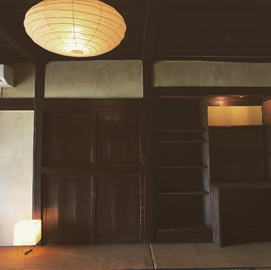
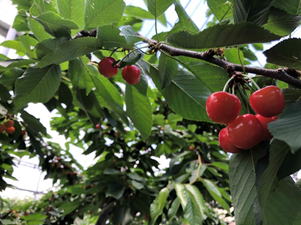
Tatsuya Inoue (Shiatsu Therapist) Born in 1976
Moved from Tokyo to Yamanashi Prefecture in February 2019.
In charge of posting to the MELSA Newsletter Column from August 2019;
"Shiatsu in global perspective".
[Academic background]
Graduated from Japan Shiatsu College 2010.
(Anma massage Shiatsu-shi qualification acquisition)
Graduated from Hokkaido University, Faculty of Literature, 2003.
One year study abroad at the University of Warwick, UK, 2000-2001.
(As a Rotary Foundation Ambassadorial Scholar)
[Career history]
Opened Shiatsu Clinic 2010.
(Now specializing in visits)
2007-2016 Worked as accounting in a foreign financial institution.
Worked as accounting department at a machine manufacturer from 2005 to 2007.
Worked as a system engineer at IT system developer from 2003 to 2005.
*WHO calls on people to avoid the 3 CS.
According to the news of "NHK-WORLD JAPAN" on Sat, July 19th,
WHO officially announced the "Three Cs"
worldwide. As you know, the cluster outbresaks have emerged in locations
where the "Three Cs" have overlapped. We have to be sure to avoid
such settings to help prevent the spread of COVID-19. These pictures are
from "NHK-WORLD JAPAN" news.

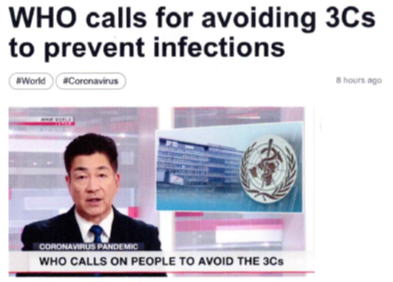
[Avoid the Three Cs]
(1) Crowded places, with many people nearby.
(2) Close-contact settings, especially where people have close-range conversation.
(3) Confined and enclosed spaces, with poor ventilation
*Additional precautions from the Japanese Ministry of Health, Labour and
Welfare (in English).
You can share the information with your friends who speak English.
20200721_ZeroC_PROffice3CGuide_en.pdf へのリンク
20200721_3Cs_000619576.pdf へのリンク
*On July 7, OTSUKA sensei sent her messege to MELSA members with the brief attached, "Three precausions in the train" by
the Ministry of Land, Infrastructure and Transport. It is written in both
Japanese and English. Therefore, it seems really helpful for everyone amid
COVID-19.
20200707_precautions_in_the_train.pdf へのリンク
[Ms. Kuniko OTSUKA Ph.D.]-Associate Professor.
-Yokohama College of Pharmacy, Department of Clinical Pharmacy. -Center
for Clinical Pharamacy.
[2020-May report]
All the MELSA's Study Group gatherings [MELSA Cafe self-study] were completely
cancelled for two months. Also we have decided to cancel all the the study
sessions at all venues from June to the end of December.
Recently, one of my friends sent me an e-mail from California, US. We learn
that we have the similar experience due to the spreading of COVID-19. For
example, as follows;--------We all have to learn to live with new restrictions
here. It was one of the first areas in the US where there were many Corona
virus infections early in the pandemic and our governor placed a stay in
place order with restrictions on travel, closed schools and practically
all nonessential business. It did help to slow down the spread so that
our healthcare system did not get overwhelmed like in New York. As of this
week we will start to lift some restrictions, some limited opening of stores
etc, but it will hardly go back to normal pre-pandemic levels. It is hard
on everyone not seeing your family and being confined at home. The school
children and teachers have a hard time adjusting to on line learning and
miss their play time with friends. The teachers and parents too struggle
to teach and learn. Here we have to wear face masks if we leave the house.------------
The following is the website from California;
Your actions save lives https://covid19.ca.gov/
People can spread the virus even if they never have symptoms.
Stay home except for essential needs.
If you go out, stay 6 feet away from others and wear a cloth mask.
 Copyright c 2020 State
of California
Copyright c 2020 State
of California
 California Department of Public Health
California Department of Public Health
[2020-April report]
The 2020 Tokyo Olympics and Paralympics was just around corner. However,
it has been postponed until next year (as of March 24, 2020). Meanwhile,
we MELSA are going to plan our new projects called "MELSA Cafe self-study
gethering" this year. We will sincerely address to do our best for
"MELSA Cafe self-study gethering" so that you can enjoy learning
something more regarding to a wide range of healthcare and medication in
English. People may be still dubious about this new project’s merits and
they even may not fully understand the project’s significance.
We understand it is not always easy to obtain positive cooperation. But
we are looking forward to learning together with you all in 2020, too.
[Notification]
1) The standard procedure before taking a lesson
★ Please show your MELSA membership ID card and write your name & ID
number on an attendance sheet before you take a lesson.
★If you forget to bring your ID card with you, please pay 2000 yen as a
regular lesson fee. You have no repayment available later on. Thank you
for your understanding and cooperation.
2) The date, venue, and time of MELSA lessons
★MELSA Cafe will be subject to whether venues are available or not.
Please check the latest schedule under the tab “SCHEDULE” page information.
[2020-March report]
March-Medical/Healthcare English Communication Mini-Lessont
The mini-lessons were held on 3/4 (Wed) Iidabashi-morning, 3/5 (Thu) Iidabashi-night,
3/25 (Wed) Yokohama- morning, and 3/29 (Sun) Sapporo- afternoon. The theme
for March was the nervous system, endocrine system, and reproductive system
(mainly women). We reviewed 9 organ systems sequentially from January.
This is the end of the mini lesson. Anatomy and physiology are fundamental
disciplines in learning medical English. We hope that everyone will continue
to deepen their knowledge of the human body from now on, too. On March
9 (Mon), the Fujisawa City Hall citizen's conference room was suddenly
closed, so we had to cancel the Shonan Fujisawathe-morning mini-lesson.
As for the previous mini-lesson of Sapporo, the governor's “Emergency Declaration”
required citizens to refrain from going out. This month, MELSA repeaters
participated again, wearing masks. The smallest special meeting room has
a capacity of 16 people. So half number of the people were sufficiently
far awayfor each seats. We paid special attention to taking care of ventilation,
and not speaking loudly for a role-playing . It is said that the risk of
cluster (group) occurrence could be much higher if the three conditions
of “closed space”, “dense place”, and “close range” appear together. Washing
hands, cough etiquette, and disinfecting items are effective. While participating"MELSA
Cafe" activities, each individual have a common awareness of either
infecting or not being infected.
March-Sports/Volunteering English Communication Mini-Lesson
The mini-lessons were held on 3/6 (Fri) Shonan Fujisawa-morning, 3/11 (Wed) Iidabashi-morning, 3/12 (Thu) Iidabashi-night, and 3/29 (Sun) Sapporo-afternoon.In March, the themes of the Olympic Games were a) Women's gymnastics competition, b) Surfing. And also the themes of “Introducing Japan in English” were a) Spring festival in Japan, b) troubles while interpreting for tour guide; "credit card purchases when shopping", and "not using the elevator while the earthquake happens.". In addition, we have extracted pages of the conversation sentences of "Manners for eating Japanese dishes" that we have learned so far, and distributed them in a collection of conversations. This is the last mini-lesson of the Sports and Volunteer English Conversation. Japanese food has been registered as a UNESCO Intangible Cultural Heritage. It seems to be one of the mopular things that foreigners most want to learn about Japan. MELSA mini-lesson may help you explain Japanese food someday in the future.
.
[2020-February report]
☆Pro. Otsuka's Special Seminar: "the 3rd"
The 3rd Special Seminar by Pro. Kuniko Otsuka; the English version of the
handbook; Preparation of instructions for medicine and instruction on medication"
(including English conversation ) was held by on February 20th (Thu) ,
in the Tokyo Volunteer Citizens' Activities Center (Iidabashi). Theme was "Diabetes Mellitus (DM)" . She showed us the picture
of "World Diabetes Day Commision in Japan". November 14th refers
to that daay.

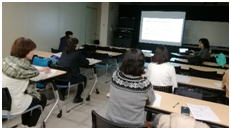


"World Diabetes Day Commision in Japan" on November 14th in 2019
[Ms. Kuniko OTSUKA Ph.D.]
-Associate Professor.
-Yokohama College of Pharmacy, Department of Clinical Pharmacy. -Center
for Clinical Pharamacy.
February-Medical/Healthcare English Communication Mini-Lesson
The mini-lessons were held on 1/30 (Thu) Iidabashi-Night, 1/31 (Fri) Iidabashi-Morning,
2/10 (Mon) Shonan Fujisawa-Morning, 2/19 (Wed) Yokohama-Morning, 3/1 (Sun)
Sapporo-Afternoon, respectively. The theme of February is the review including
the digestive, circulatory and urinary systems.
In January, we reviewed the skeletal, muscular, and respiratory systems.
In March, we will complete the review of the nervous, endocrine, and reproductive
systems.
For the past two or three years, there have been many requests from members
for the “Medical English / English Conversation” mini-lessons. So we have
been preparing materials and conducting exercises mainly for medical English
conversation in clinics and hospitals.
Needless to say, if you work in the medical profession, knowledge of anatomy and physiology is fundamental to healthcare professionals during the medical specialty curriculum.
Even from each individual cell to the entire individual, the anatomy and
physiology fields are enormous, even if they are systematically learned
according to the hierarchy of the human body structure and organized into
organ systems.
However, it is an indispensable area for anyone involved in the medical
field. You must understand illnesses, abnormalities and disabilities, and
understand the basics of medication and surgical procedures.
If you want to do the best intervention in the medical field, you need to understand the normal condition of the human body.
However, in MELSA mini-lessons, many people are interested in medical English
interpreters, but we could not deny that they were more likely to hesitate
to learn the anatomy and physiology fields.
The anatomy and physiology that elucidate the structure and function of
the human body are closely related. "Why do we get sick?" People
have various questions when learning about the body.
The answer to that question begins with learning the basic vocabulary related
to the anatomy, physiology and pathology when talking with medical professionals.
We once again realize that each organ system works stably to sustain life, that is, homeostasis and what happens when this delicate balance is disrupted.
And we would like to complete the mini-lesson learning the overview of
all systems.
It is implied that all the review integrates the story above mentioned.
We hope this review will be a great opportunity for us to learn more about
the progress and research related to medical science field in the future.
February-Sports/Volunteering English Communication Mini-Lesson
The mini-lessons were held on 2/7 (Fri) Shonan Fujisawa-morning, 2/13 (Thu)
Iidabashi-night, 2/14 (Fri) Iidabashi-morning, and 3/1 (Sun) Sapporo-afternoon.
The themes of February about the Official Olympic Games were a) relay race,
b) sailing. As usual, we read the basic knowledge and rules of the competition
in English. In February, the theme of “Introducing Japan in English” was
a) Theme parks in Japan, b) Manners for eating hot pot dishes. In addition,
we practiced how to deal with problems at the interpreting guide, “problems
with shoes in Japanese-style rooms”, and “Japanese-style rooms and beds
in inns”. It was really helpful for us how to explain in English in such
a situation.
[2020-January report]
☆Ms. Mori's Special Seminar: "the 8th seminar of improving medical English interpreting skills"
Special Seminar was held on January 17 (Fri), 19:00-20:30, Iidabashi, Tokyo
Volunteer Center 10F, Room B (40 seats). The lecture was Ms. Reiko MORI
as usual. Theme was Obstetrics and Gynecology (2).


[Ms. Reiko MORI]
-A freelancer, medical/pharmaceutical interpreter and translator.
-A medical/healthcare interpreter.
-Worked for pharmaceutical company for nearly 19 years.
-Lived abroad for 10 years (5 years in US, 5 years in Hong Kong)
January-Medical/Healthcare English Communication Mini-Lesson
On 1/8 (Wed) Iidabashi-morning, 1/9 (Thu) Iidabashi-nighttime, 1/20 (Mon)
Shonan Fujisawa, 1/26 (Sun) Sapporo-afternoon, and 1/29 (Wed) Yokohama,
each mini-lesson was held, respectively. We have started reviewing the
first three systems out of 9 systems. This month included the skeletal
system, the muscular system, and respiratory system.
January-Sports/Volunteering English Communication Mini-Lesson
On 1/10 (Fri) Shonan Fujisawa-morning, 1/15 (Wed) Iidabashi-morning, 1/16
(Thursday) Iidabashi-nighttime, and 1/26 (Sun) Sapporo-afternoon, each
mini-lesson was held, respectively. The January’s sports themes of Olympic
Games were a) tennis, b). As usual, we read the basic knowledge and rules
of the competition in English.
January’s themes of “Introducc Japan in English” were a) Gorgeous Japanese
kimono and b) Manners for eating skewered foods. It was included the receipt
how to make Okonomiyaki (Japanese pancakes) in English.
[2019-December report]
December-Medical/Healthcare English Communication Mini-Lesson
On 12/3 (Tue) Iidabashi-morning, 12/5 (Thu) Iidabashi-nighttime, 12/9 (Mon)
Shonan Fujisawa, 12/18 (Wed) Yokohama, and 12/22 (Sun) Sapporo-afternoon,
each mini-lesson was held, respectively. This month's "Internal medicine"
Lesson 12 included a) Overview: obstetrics and gynecology (period, discharge),
b) uterus myoma ①. “Surgery” Chapter 12 included a) uterus myoma ②, b)
cervical cancer check-up and HPV vaccination. The themes of Warm-up Listening
CD were “benefits of bilinguals (5)” and “micro-hospitals (2)”.
December-Sports/Volunteering English Communication Mini-Lesson
On 12/6 (Fri) Shonan Fujisawa-morning, 12/11 (Wed) Iidabashi-morning, 12/12 (Thursday) Iidabashi-nighttime, and 12/22 (Sun) Sapporo-afternoon, each mini-lesson was held, respectively. The July’s sports themes of Olympic Games were a) b). As usual, we read the basic knowledge and rules of the competition in English.
December’s themes of “Introducc Japan in English” were a) lifestyle-related diseases and health consciousness (health-oriented people), and b) Manners for eating; to take friends on Japanese gourmet tours. It was included the receipt how to make Okonomiyaki (Japanese pancakes) in English.
[2019-November report]
♪2019 MELSA Special Seminar♪
☆Doctor & Nurse Collaboration Seminar was heeld on November 29 (Fri) 19:00-20:30, Iidabashi, Tokyo Volunteer Center 10F, Room
B (40 seats)
Lecture was provided by Dr. Mido and Ms. Euykyoung Gu, RN.

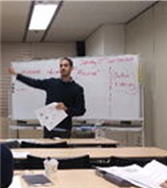

Theme: "Improving communication between foreign patients and nurses"
[Content]
1- Self-introduction (Ms. Euykyoung Gu, RN)
2- About her working place in brief; The University of Tokyo Hospital
3- Definition of Nurse
4- Assuring the patient
5-Assisting the patient
6- Sharing the patient’s feelings
7- Roleplay and dialogue practice


♪"Shiatsu - in Global Perspective" from Japan by Tatsua INOUE (Shiatsu Therapist)♪
[English Comments for dialogue 2]
Shiatsu has 2 main streams. One is based on western medical concept, the
other is based on oriental medical concept. The former is Namikoshi shiatsu,
and the latter is Zen shiatsu, it is my opinion. I myself do Namikoshi
shiatsu. Interestingly, Namikoshi style is popular in Japan, and Zen style
is popular outside Japan. This is actually opposite from general impressions.
My clients from overseas are very surprised when I explain about shiatsu.
They think Japanese shiatsu style is Zen.
However, nobody gets disappointed, they would rather get interested more.
Seeing this dialogue, Namikoshi style introduces oriental medical concept in the point that it checks whole body, though Namikoshi style is based on western medical concept.
It is very important to have this kind of communication before shiatsu sessions for the clients to get more relaxed during the sessions.
[2. Explanation after medical interview]
T: Please let me explain the session plan, because it is very important that you know how I do the session.
C: Please do.
T: All shiatsu sessions here are whole-body session, from head to toe. It is more effective to do whole-body than focusing on specific parts only. Of course, I will focus on your lower back, but the lower back is connected to many body parts, such as your abdomen, your legs, your hips, your back, and your neck. Even if you feel pain only around your lower back, many muscles which are connected to it also have tension or pain in many cases. Loosening up those tensions as a whole can reset your body balance and it would be a more effective way to ease your pain.
C: Oh, it is my first time to hear that, but sounds good. Are there any other benefits of whole-body sessions?
T: Yes. When you get a whole-body session, your whole blood circulation will be improved. After the session, you will be more refreshed than just getting the treatment on some specific parts.
C: I understand. Sounds great.
T: Is it OK if I do a whole-body session for you?
C: Yes. I`m looking forward to it.
...............................................
 Mt. Fuji [by Mr. Inoue on October 23rd]
Mt. Fuji [by Mr. Inoue on October 23rd]
The location is in Nirasaki-City, Yamanashi prefecture, from a beautiful winery parking lot, about 15 minutes by car from his home.
..............................................
November-Medical/Healthcare English Communication Mini-Lesson
On 11/6 (Wed) Iidabashi-morning, 11/7 (Thu) Iidabashi-nighttime, 11/11 (Mon) Shonan Fujisawa, 11/27 (Wed) Yokohama, and 12/1 (Sun) Sapporo-afternoon, each mini-lesson was held, respectively. This month's "Internal medicine" Lesson 11 included a) medical English for pharmacists, b) prescription for high blood pressure. "Surgical" Chapter 11included a) hematuria, b) climacteric syndrome. The themes of Warm-up Listening CD were “benefits of bilinguals (5)” and “micro-hospitals (2)”
November-Sports/Volunteering English Communication Mini-Lesson
On 11/8 (Fri) Shonan Fujisawa-morning, 11/12 (Tue) Iidabashi-morning, 11/14
(Thu) Iidabashi-nighttime, and 12/1 (Sun) Sapporo-afternoon, each mini-lesson
was held, respectively. The November’s sports themes of Olympic Games were
a) 3000m steeplechase, b) modern pentathlon. As usual, we read the basic
knowledge and rules of the competition in English. November’s themes of
“Introducing Japan in English” were a) Japanese Martial Art and b) Manners
for eating; how to eat fresh seafood tempura at a restaurant in the fish
market.
[2019-October report]
MELSA October's Special Seminar (A)
The 2nd Special Seminar by Pro. Kuniko Otsuka; the English version of the
handbook; Preparation of instructions for medicine and instruction on medication"
(including English conversation ) was held by on October 24th (Thu) , in
the Tokyo Volunteer Citizens' Activities Center (Iidabashi).


[Ms. Kuniko OTSUKA Ph.D.]
-Associate Professor.
-Yokohama College of Pharmacy, Department of Clinical Pharmacy.
-Center for Clinical Pharamacy.
MELSA October's Special Seminar (B)
The 3rd Special Seminar by Dr. Ozaki; "Association betwee the Gut
Microbiota, Bone Metabolism, and Fracture Risk in Japanese Postmenoposal
Women" was held on October 17 (Thursday), 19: 00-20: 30, in the Tokyo
Volunteer Citizens' Activities Center (Iidabashi).



October-Medical/Healthcare English Communication Mini-Lesson
On 10/3 (Thu) Iidabashi-nighttime, 10/7 (Mon) Shonan Fujisawa-morning,
10/9 (Wed) Iidabashi-morning, 10/20 (Sun) Sapporo-afternoon, 10/30 (Wed)
Yokohama-morning, MELSA mini-lesson was held, respectively. Internal medicine
Lesson 10 included a) Roseora infantum, b) pediatric allergy. Surgery Chapter
10 included Urology a) Acute Cystitis (Bladder Infection), b) Benign Prostatic
Hypertrophy (BPH). The October's Warm-up Listening themes were "Cases
of Measles in Europe rose sharply in 2018" and "Climate Change
(2)". Because people are more likely to travels more and more globally,
infectious diseases (vaccinations) and climate changes are becoming more
important issues than ever.
October-Sports/Volunteering English Communication Mini-Lesson
On 10/7 (Mon) Shonan Fujisawa-morning, 10/8 (Tue) Iidabashi-morning, 10/10
(Thu) Iidabashi-nighttime, 10/20 (Sun) Sapporo-afternoon, MELSA mini-lesson
was held respectively. In October, the theme of the “Olympic Games” included
a) men’s gymnastics, and b) road cycling. In addition to the basic knowledge
and rules about men's gymnastics, the article “Like Father, Like Son (Japanese
gymnasts, Mitsuo Tsukahara (father) and Naoya (son)”was added, such an
impressing story of the first parent-child gold medal in gymnastics. The
themes of “Introducing Japan in English” included a) thanks to homemade
Japanese dishes, and b) manners for Japanese meals “Washoku”, #6 “Fish
dishes & Sashim”. Not only just for eating fish dishes but also any
other occcasions to eat Japanes meals, manners seem to be elegant and
beautiful so that even leftover food won't be ungraceful after eating,
too.
[2019-September report]
MELSA September's Special Seminar (A)
“Introducing Japanese culture in English: What is Tea Ceremony”
On September 20 (Friday) during19: 00-20:30, the special seminar "Introducing Japanese culture in English: What
is a tea ceremony” was held by Prof. Kinoko Takahashi.



[Prof. Kinuko TAKAHASHI]
-Professor at Osaka Jogakuin University, Faculty of International and English
Studies since September 2018. -Specializes in applied linguistics and phonetics
-Worked as a Japanese-English interpreter for over 20 years after graduating from Sophia University, Faculty of Foreign Languages,
Department of German.
-Completed the doctoral program at Sophia University in 2013. Doctoral (linguistics).
-Associate member of Sophia University Institute for International Language
Information.
-Interpreter guide passed in 1997.
-Started tea ceremony from the second year of junior high school.
 (photos by OMORI)
(photos by OMORI)
You can enjoy Matcha (powdered green tea) in a cafe au lait bowl using
simple tea utensils at home.
MELSA September's Special Seminar (B)
”The 7th Medical English Interpretation Skills Improvement Seminar"
On 9/6 (Fri) 19: 00-20: 30 at Iidabashi, the 7th Medical English Interpretation
Skills Improvement Seminar “Obstetrics and Gynecology (1)” was held by
Ms. Reiko Mori. Interpretation in the field of obstetrics and gynecology
is expected to include various situations such as pregnancy, gynecological
diseases and contraception. Ms. Mori considered how to use the materials
so much. To make it easier for the participants to interpret, the words
required for the scenario according to the scene were also listed. Long
Japanese sentences that were difficult to interpret also were explained
with examples of translation, making it easier to practice interpreting.
The speed of the conversation between the patient and the doctor while
watchin and listening YouTube screens was very fast for. However, we were
able to practice reading with the script at the same time. Some MELSA members
and staff were selected as volunteers for the Rugby World Cup, so the number
of participants was smaller.But 13 people attended. Thank you for your
participation.
September-Medical/Healthcare English Communication Mini-Lesson
On 9/4 (Wed) Iidabashi-morning, 9/5 (Thu) Iidabashi-nighttime, 9/23 (Mon)
Shonan Fujisawa-morning, 9/25 (Wed) Yokohama-morning, 9/29 (Sun) Sapporo-afternoon,
it was held, respectively. This month's Internal Medicine Lesson 9 is for (a) fever cramp and (b)
measles. Surgery Chapter 9 is for (a) osteoporosis and (b) locomotive syndrome.
When the motor organs such as bones, joints and muscles decline with aging,
the degree of independence in daily life decreases, and the risk of injury
and fractures may increase due to falls etc. Preventive training is also
included in the dialog between a doctor and a patient . Warm-up Listening
is for “Wellness Tourism (2)” and “Climate Change (1)”. On September 23,
the United Nations Climate Action Summit, (UN Summit), was held in New
York. The Summit was held for the first time in five years with the aim
of accelerating global warming countermeasures. Seventy-seven countries
have pledged that greenhouse gases such as carbon dioxide will be virtually
eliminated in 2050.
September-Sports/Volunteering English Communication Mini-Lesson
On 9/6 (Friday) Shonan Fujisawa-morning, 9/11 (Wednesday), Iidabashi-morning,
9/12 (Thu), Iidabashi-nighttime, and 9/29 (Sunday) Sapporo-afternoon, it
was held, respectively. The theme of the “Olympic Official Event” in September
is for (a)Triathlon and (b) Handball. Basic knowledge and rules will not
only improve our vocabulary, but will also provide us a lot of information.
The theme of “Introducing Japan in English” in September is for (a) “Japanese
subculture” and (b) “Introduction to manners of noodles (when eating)”.
In Japan, it is acceptable to slurp noodles unlike in Western countries.
Eating noodles with a sound is not a rude manner in Japan because there
seems to be two reasons for that. Do you happen to know them?



“Japanese subculture” was found inside JR Sapporo Station Building. Photos
by OMOri (September 29th in 2019)
[2019-August report]
"Shiatsu - in Global Perspective" from Japan by Tatsua INOUE
(Shiatsu Therapist)
Tourists from overseas sometimes visit my clinic. Most of them are from
European countries, and clients from Asian countries are quite rare.Their
academic levels are relatively high and they tend to have strong interest
in Japan and its culture. In my opinion, they might come up with the word,
"shiatsu" while they are trying to understand Japanese culture.
Most of them understand Japan and its culture very well.
Therefore, they asked me questions about shiatsu from various points of
view. This shows they have strong interest in shiatsu. This is why how
a small shiatsu clinic like mine would be searched on the web and found
by people all over the world. Now I will introduce the shiatsu treatment
at my previous clinic in English.
[1. During medical interview] T: Therapist, C: Client
T: What's brought you here today?
C: I came to Japan to travel and I have been to many places so far.
C: I have been to Kyoto, Hiroshima, and Tokyo. I have been doing a lot of walking. I have had a lower back pain before I came to Japan, and it is getting worse after all the walking.
T: Which side of your lower back do you feel more pain? The right or the left side?
C: It's actually on both sides.
T: OK, both. Could you please point out around where you feel it?
C: Just above my hips, here.
T: OK. Could you please describe the pain? Is it a sharp pain, or a dull pain?
C: It is a dull pain. And I remember it gets worse at night.
T: Thank you, this is very helpful information. Other than your lower back, anything else?
(to be continued)
August-Medical/Healthcare English Communication Mini-Lesson
On 8/5 (Mon) Shonan Fujisawa-morning, 8/6 (Tue) Iidabashi-morning, 8/8
(Thu) Iidabashi-nighttime, 8/21 (Wed) Yokohama-morning, 8/25 (Sun) Sapporo-afternoon,
it was held, in each. In August, Internal Medicine Lesson 8 was for pediatric
pediatrics (1); a) vaccination in children and b) chickenpox (varicella).
Surgery Chapter 8 was for a) backache / low back pain / lumbago and b)
knee ache / osteoarthritis. Warm-up Listening was “Study: Going to Vacation
Reduces Risk of Heart Disease” and “Tour Wellness Tourism (1)”. We gathered
topics about life work balance and health-consciousness. You should always
get the latest information on vaccinations. In addition to children, it
is important for junior high school students, high school students and
adults to know and prevent VPD (VaccinePreventable Diseases) to prevent
infectious diseases.
August-Sports/Volunteering English Communication Mini-Lesson
On 8/9 (Friday) Shonan Fujisawa-morning, 8/14 (Wednesday), Iidabashi-morning,
8/16 (Thu), Iidabashi-nighttime, and 8/25 (Sunday) Sapporo-afternoon, it
was held, respectively. The theme of the “Olympic Official Event” in August
was (1) race walking and (2) 10-game decathlon. We read basic knowledge
and rules of them in English. The themes of “Introducng Japan in English”
in August were for “a) Izakaya; a Japanese pub” and b) “Manners for Eating
at Izakaya”. Japanese manners such as when using hand towels and when drinking
beer and liquor are likely to become a topic of cross-cultural understanding.
[2019-July report]
"Summer-Medicine Seminar" by Japanese Society of Travel Medicine
The summer medicine seminar was held by Japanese Society of Travel Medicine
on 7/6 (Sat) at 10: 00-15: 25 in Ochanomizu Sora City Conference Center. THere were several lectures
as follows; "For a safe and secure mountaineering of Fuji: 15 years
of the Fujiyoshidaguchi mountain climbing trail Hachijoku relief center
15 years", "Heat heat environment and heat stroke", and
"UV protection: sunburn, corridor, skin cancer prevention" etc.
Regarding "Tokyo 2020 Games" next year, all the lectures gave participants a lot of information ot
be kept in mind. The Seminar is really useful and practical for not only
spectators but also volunteers who are helping and supporting tournament then.
The Tokyo MEDS July study
The Tokyo MEDS July study session was held on July 14 (Sun) in Showa University School of Medicine (Kannodai, Shinagawa-ku, Tokyo). The
contents were "Bone and Muscle Muscle and Joint Problems". The
lecturer was Dr. Takayuki Osomi (Associate Professor, International University
of Health and Welfare). Although he proceeded his lecture all in English,
a lot of easy-to-understand slides and materials are distributed in advance,
so it is possible to study and be able to prepare for it. How about participating
in the Tokyo MEDS seminar with medical students together next time?

MELSA August's Special Seminar by Pro. Kuniko Otsuka
"The English version of the handbook; Preparation of instructions
for medicine and instruction on medication" (including English conversation
) was held by Pro. Kuniko Otsuka on July 1 (Mon) at Fujisawa City Hall.


July-Medical/Healthcare English Communication Mini-Lesson
On 7/3 (Wed) Iidabashi-morning, 7/4 (Thu) Iidabashi-night, 7/8 (Mon) Shonan
Fujisawa-morning, 7/24 (Wed) Yokohama-morning, 7/28 (Sun) Sapporo-afternoon,
it was held, in each. In August, Internal Medicine, Lesson 7 was for a)
Iron Deficieency Anemia and b) Home visit House call. Surgery, Chapter
7 was for Dentistry; a) Dental appointmen and b) Toothacche. Warm-up Listening
CD was from an article related to “Japanese not getting enough sleep” and
an article related to AI, “College seniors worried AI could replace their jobs ”. When Artificial Intelligence (AI) moves into various fields, it seems to raise concerns for the job hunting of students.
July-Sports/Volunteering English Communication Mini-Lesson
On 7/5 (Fri) Shonan Fujisawa- morning, 7/10 (Wed) Iidabashi-morning, 7/11
(Thursday) Iidabashi-night, 7/28 (Sun) and Sapporo-afternoon, it was held,
respectively. The theme of the July Olympic Games was the one-pole high-pole
pole-vault 2100 meter sprint the 100-meter sprint. As usual, we read the
basic knowledge and rules of the competition in English, but this month,
we additionally read the moving story of English and English, as follows “Japan's new record 9.98 seconds“ Breaking the 10-Second Barrier ” established
by Kiyoyoshi Hideo (Kiyoshi Yoshide). The theme of “Introducc Japan in
English” in July was a) Japanese Festival of Japan, and b) Mannrs for eating
Sushi for Sushi. It is fun to read in English about the Gion Festival in
Kyoto, the Aomori Nebuta Festival in Aomori Prefecture, the Awa Dance in
Tokushima, etc. Also, it seems that the manners at the sushi restaurant
other than just eating sushi are also popular among foreigners.
[2019-June report]
☆ 2019/6 / 14-16 “CRITICAL LINK INTERNATINAL CLI 9 TOKYO”
It was held at Akasaka Campus, International University of Health and Welfare
University. It is the first meeting in Asia at an international conference
of interpreter practitioners and researchers. It is a world tournament
once in three years. The chief chairman is Prof. Takayuki Oshimi (Associate
Professor, Center for Medical Education, Faculty of Medicine, International
University of Health and Welfare). Mr. Oshimi is also an adviser from the
beginning of MELSA establishment (2013). This time, we participated in
the fact that Asia's first world convention will be held in Tokyo (Omori).


Special Seminar by Ms. Reiko Mori
"Medical English Interpreting Skills Upgrade Seminar # 6" was
held by Ms. Mori on June 21 (Fri) at Tokyo Volunteer Citizens' Activities
Center (Iidabashi). The subjects were 1) "Machine translation (MT)
and medical interpreters' future predictions" (summary of Ms. Mori's
master's thesis) and 2) "important words and phrases in the hospital
reception and their conversation practice". It was indicated in her
seminar that sufficient training and lots of practical achievements as
a medical interpreter, and if we emphasize the relationship that we can
build only between people, we will coexist without being threatened by
AI (machine translation equipment). It would be possible to continue working
with medical voice translation machines together.
June-Medical/Healthcare English Communication Mini-Lesson
Mini-Lessons were held on 6/5 (Wed) Iidabashi-morning, 6/6 (Thu) Iidabashi-night,
6/10 (Mon) Shonan Fujisawa-morning, 6/19 (Wed) Yokohama-morning, 6/23 (Sun)
Sapporo-afternoon,respectively. This month's “Internal medicine” Lesson
6 was a) HCV Chronic Hepatitis, b) Thyroid Diseases, and "Neurosurgery"
Chapter 5 was a) Migraine without Aura, b ) Migraine with Aura. Warm-up
Listening CD from medical related articles was "(Chinese schools)
to limit homework, to protect the eyes" . The other Warm-up Listening
CD was "Scientists are helping people stand on their own feet; a robotic
suit Rex". The topic is that a man who suffers from cancer and is
paralyzed and uses a wheelchair can stand and walk by wearing a robot suit
called "Rex". Now is the age when artificial intelligence (AI)
is applied to various fields. The G20 AI Principles on the development
and utilization of AI were agreed in the G20 (June 28-29) held in Osaka,
where the world leaders gathered the other day. As a feature of the principle,
respect for the rule of law and human rights. The concept of "human-centered",
which uses AI as a human tool, is a pillar. It is also related to this
month's topic.
June-Sports/Volunteering English Communication Mini-Lesson
Mini-Lessons were held on 6/7 (Fri) Shonan Fujisawa-morning, 6/12 (Wed)
Iidabashi-morning, 6/13 (Thursday) Iidabashi-night, 6/23 (Sun) Sapporo-afternoon,
respectively. The theme of the official Olympic Games in June was 1) Diving,
2) Women's basketball. We read the basic knowledge and rules of the competition
in English. The theme of “Introducing Japan in English” in June was a)
Japanese Lacquerware called “urushi” or “shikki”, and b) Manners for Using
the Dishes in Washoku (Japanese Cuisine). We have reaffirmed a lot of valuable
information about the elegant way of eating Japanese food. In addition,
we practiced explanation how to distinguish pottery and porcelain in English,
and also challenged the quizes to choose famous traditional crafts and
local places for maching each photo.
[2019-May report]
Special Seminar by Dr. Mido
The theme “Cross-cultural communication in Mediine” was held on May 26
(Sun), 12:00-13:30 in Sapporo.
[Why Oral Communication] The reasons are 1) Less expensive, 2) Saves time,
3) Immediate feedback, 4) Personal interaction, 5) Useful in difficult
situation, 6) Co-operative spirit, 7) Persuasive, and 8)Useful for all
kinds of audiences.
[Doctor?Patient Communication] Goal is to provide patient-centered care.
THere are seven Elements, such as 1) Active listening, 2) Empathy, 3) Building
Rapport, 4) Open ended vs closed-ended, 5) Silence (Silence is golden.
Thoughtful and accurate answer can be created.) , 6) Avoid ”Why”question0s,
7) Non-verbal communication.
[Take home messages]
1) Communication elements are your guide for providing excellent care,
2) Interrupt and let people interrupt you to understand well, 3) Speak
up and speak out! , 4) Nobody cares about your accent!, 5) If you don’t
know a word, use a different strategy!

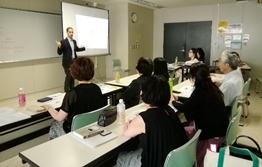


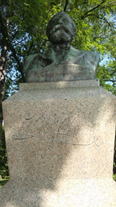

2019/5/25 Sightseeing Spots; Clock Tower, Sapporo TV Tower, and the Statue
of Dr. Clark at Hokkaido University Campus.
 "Speaking ticket vending machine" in JR Sapporo Station.
"Speaking ticket vending machine" in JR Sapporo Station.
[Mohamed Abdelhakim, MD. ]Profile; Staff Doctor; -International medical doctor at department of Plastic and
reconstructive surgery of Nippon Medical School Hospital. Graduate Student;
-joined the graduate school of Nippon Medical School, Mechanobiology and
mechanotherapy Laboratory -part time lecturer and Medical English and communication
class instructor, NMS. -Graduate of Cairo university, Egypt. -Completed
clerkship at St.Luke's international hospital, Tokyo.
“The 92nd Annual Meeting of the Japanese Orthopedic Association”
The 92nd Annual Meeting of the Japan Orthopedic Association was held from
May 9 (Thu) to 12 (Sun), 2019 in Pacifico Yokohama (Yokohama City). The
chief chairman is Professor Toshihiko Yamashita (Department of Orthopedic
Science, Sapporo Medical University School of Medicine). The main theme
is "The energy in orthopedics is the energy in Japan".
In the modern society, the importance of orthopedics in charge of musculoskeletal treatment is becoming increasingly important in all generations, including children, working generations, and the elderly. For the 2020 Tokyo Olympics and Paralympics, orthopedic power is also expected to improve athletes' ability to prevent injuries and competence. Thus, an academic general meeting that appeals widely that the health of orthopedics (activation and development of medical treatment and research) contributes to the health of Japan (promotion of the health of the people and society).
"Special Lecture" "A Challenge to Dreams" Yasuhiro Yamashita (General Manager of Japan Olympic Committee Players / President of All Japan Judo Federation), "A New Evolution of Earth Life Homo sapiens" Mamoru Mori (Director, Japan Science and Future Museum, President/Astronaut ). << Present and Future of Regenerative Medicine in Japan >> Speaker 1 Professor Sawa Yoshiki (Osaka University School of Medicine Cardiovascular Surgery: iPS Cell Derived Myocardial Cells) 2 Nakamura Noriyoshi (Osaka University School of Health Medicine: Department of Cartilage Regeneration Research) 3 Sekiya Ichiro (Tokyo Medical and Dental University Regenerative Medicine Research Center: synovium-derived stem cells) 4 Professor Masaya Nakamura (Keio University School of Medicine Orthopedic Science Class: iPS cell-derived neural stem cells) 5 Prof. Nozomu Osamu (Sapporo Medical University School of Medicine): Regenerative medicine for cerebral infarction and spinal cord injury "Self-cultured bone marrow mesenchymal stem cells".


Appointed Astro Boy as a symbol of "Japanese spirit".
May- Medical/Healthcare English Communication Mini-Lesson
Mini-Lessons were held on 5/8 (Wed) in Iidabashi-morning, 5/9 (Thu) in
Iidabashi-night, 5/13 (Mon) in Shonan Fujisawa-morning, 5/26 (Sun) in Sapporo-afternoon,
5/29 (Wed)in Yokohama-morning. As this month's internal medicine theme,
Lesson 5 has (a) acute coronary syndrome (b) palpitations. Chapter 5 as
"Surgery" has (a) conjunctivitis (b) cataract. Warm-up Listening
related to the medical field article was "Accepting Overseas Medical
Workers" for foreign workers in the medical field. At the same time
in Japan, "the expansion of foreign workers' acceptance" has
just been implemented in April. It also relates to Dr. Mid's special seminar
“Cross-cultural communication in Mediine”. However, regardless of nationality,
more smooth communication will be required in medical practice.
May- Sports/Volunteering English Communication Mini-Lesson
Mini-Lessons were held on 5/14 (Tuesday) in Iidabashi-morning, 5/16 (Thursday)
Iidabashi-night, 5/17 (Fri) Shonan Fujisawa-morning, 5/26 (Sun) Sapporo-afternoon,
respectively. The theme of the “Olympic Games Official Event” in May was
(1) a 7-man "rugby sevens", (2) field hockey. The theme of “Introducing
Japan in English” was “Shin Yokohama Ramen Museum. In general, soups are
made from chicken or pork bone-based soup, mainly salty, soy sauce or miso.
In Japanese manners, it was "how to use chopsticks". And also
we practiced the correct usage and the explanation of six tabs in having
"Washoku". Finally, while seeing pictures of Japanese confectionery,
gave a Japanese confectionary name in Japanese, and also gave explanations
in English.
[2019-April report]
April Special Seminar by Dr. Ozaki
"Special Seminar # 2; Wheelchair Tennis and Wheelchair Rugby"
was held by Dr. Ozaki on April 18 (Thursday), 19: 00-20: 30 in the Tokyo
Volunteer Citizens' Activities Center (Iidabashi). At that night, Ozaki-sensei
brought a wheelchair specially。So the participants actually had the experience
of riding and trying as a caregiver.
During this seminar, International Business Communication Association IiBC
visited to have interviews with him and participants. The Article will
be on the IiBC NEWSLETTER (booklet) in early July.
You can see the back issue number from here.
https://www.iibc-global.org/iibc/activity/iibc_newsletter.html


From the left in the front row; Dr. Orim (Internist), Irene (a sort-term
resident at Nippon Medical School), Dr. Ozaki, Dr. Mido (the graduate school
of Nippon Medical School).
April- Medical/Healthcare English Communication Mini-Lesson
April Medical/Healthcare mni-lesson
Mini-Lessons were held on 4/3 (Wed) Iidabashi-morning, 4/4 (Thu) idabashi-nighttime, 4/15 (Mon) Shonan Fujisawa-morning, 4/17 (Wed) Yokohama-morning, 4/21 (Sun) Sapporo-afternoon, respectively. In Internal medicine; Lesson 4 was Dermatology related to (a) Adult Type Atopic Dermatitis, (b) Herpes Zoster, Shingles. In Surgery,
Chapter 4 was about a) Ophthalmology (eyes) and b) Otorhinolaryngology; Dizziness (Mesiere’s Disease). Regarding one of the “AI” story, the theme of Warm-up listening CD was “Robotic device lightens worker’s loads”.
April- Sports/Volunteering English Communication Mini-Lesson
Mini-Lessons were held on 4/10 (Wed) in Idabaishi-morning, 4/11 (Thu) in
Iidabashi-nighttime, 4/12 (Fri) in Shonan Fujisawa-morning, 4/21(Sun) in
Sapporo-afternoon, respectively. In April, themes of sports games were
“Taekwondo” and “BMX bicycle motocross”. One of the themes, introducing
Japan in English, was “Kabuki and Kabuki theatre”. It is very difficult
to explain them in English unless you are familier with the terms in Japanese,
too. And the other theme was “Basic Manners for Eating Washoku”. It is
interesting to tell the differences and similalities between Japan and
foreighn countries. Do you know how to eat one soup and three dishes (the
so-called sankaku-tabe, or triangle eating? It is totally different from
western style eating manners. It is one of the amazing strict manners while
eating washoku, isn’t it? Japanese food (washoku) is registered as a UNESCO
Intangible Cultural Heritage, so we practiced the explanation about that.

The state of "Sports Volunteer English Conversation" study session
at Fujisawa venue was posted and posted.
https://fj-games2020.jp/contribution/support/12/
[2019-March report]
Special Seminar by Ms. Reiko Mori
"Medical/Healthcare Interpreting skill-up Seminar # 5" was held
on March 15 (Fri), 19:00-20:30, in Iidabashi, Tokyo Volunteer Center. Themes
were "Anesthetics (1)" and "Orthopedics, Bones and Joints
(2)". First of all, we confirmed words and phrases related to bones
and joints in the anatomy. After that we spent most of the time on practicing
interpretation (from Japanese into English) about "explanations before
anesthetics" .

-A freelancer, medical/pharmaceutical interpreter and translator.
-A medical/healthcare interpreter.
-Worked for pharmaceutical company for nearly 19 years.
-Lived abroad for 10 years (5 years in US, 5 years in Hong Kong)
March- Medical/Healthcare English Communication Mini-Lesson
Mini-Lessons were held on 3/6 (Wed) Iidabashi-morning, 3/7 (Thu) idabashi-nighttime,
3/11 (Mon) Shonan Fujisawa-morning, 3/17 (Sun) Sapporo-afternoon, 3/27
(Wed) Yokohama-morning, respectively. Lesson 3 was about Internal medicine,
(a) hypertension and (b) stroke、and Chapter 3 was about Surgery, (a) hay
fever and (b) ear infection (Otitis Media). Theme of Warm-up listening
CD was “Paper products cut plastic pollution”. Around the world, it is
urgent to reduce plastic waste to protect the environment.
Coincidentally, the winning works of "the beautification and recycling
promotion poster" were displayed on the bulletin board on the 1st
floor lobby of the Fujisawa City Hall Main Office Building. It might be
a topic that children have often told about at home and/or school in the
intellectual, moral, and physical education. Although all the works were
painted by primary school students, it was really impressive to see their
high awareness and ability of expression.
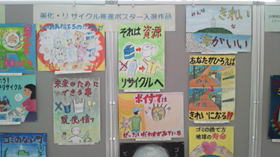
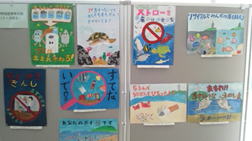


(Photographs: by Omori 2019/2/18)
Mini-Lessons were held on 3/8 (Fri) Shonan Fujisawa-morning, 3/13 (Wed)
Idabaishi-morning, 3/14 (Thu) Iidabashi-nighttime, 3/17 (Sun) Sapporo-afternoon,
respectively. In March, themes of sports games were “beach volleyball”
and “rowing”.
[2019-February report]
☆Special Seminar by Mr. SON, YOUNG HWAL
The special seminar by was held onFebruary 13 (Wed) at 10:00-11:30 in Kanagawa
Kenmin Center (Yokohama). Title was "Volunteering in English - How
to Help Foreign Visitors". He shows lots of useful English expressions
to us (participants), especially, how to give a direction when we encounter
foreign visitors in a town. In addition, we were able to focus on simulation
guide about some of the top ten popular sightseeing spots of Yokohama.

Lecturer: SON, YOUNG HWAL
-English Techer.
-BBA in Marketing, University of Iowa (1987).
-MA in East Asian Languages and Cultures, University of Kansas (1990).
-Worked in Entertainment/Media/Intellectual Business for nearly 30 years.
- Lived in the USA for 10 years.
February Medical/Healthcare English Communication Mini-Lesson
Mini-Lessons were held on 2/5 (Tue) Iidabashi ?morning, 2/7 (Thu) Iidabashi
?nighttime, 2/18 (Mon) Shonan Fujisawa-morning, 2/24 (Sun) Sapporo-afternoon,
2/27 (Wed) Yokohama-morning, respectively. Lesson 2 was about “Asthma /
Type 2 Diabetes Mellitus” and Chapter 2 was about “Gastric Ulcer &
Gastric Cancer / GERD gastroesophageal reflux disease”. In February, the
theme of Warm-up Listening CD was “Free Cafeterias Helps Poor Children”.
It is called “kodomo shokudo” in Japanese. It means “children’s cafeteria”.
The cafeterias provide food for free, or at a low cost. It’s movement that’s
spreading nationwide. A government survey found one out of six children
in Japan lived in poverty in 2012. There is a comment from MELSA participants,
which requests to focus on only medical English. However, MELSA doesn’t
always provides the place learning medical/healthcare English communication
only. We will not change in our stance ever. Our aim and vision regard
a thing as important, such as taking a look at the trend of the times worldwide,
becoming aware of the issues around us, and sharing the time to consider
together for only several minutes during a lesson.
February Sports/Volunteering English Communication Mini-Lesson
Mini-Lessons were held on 2/8 (Fri) Shonan Fujisawa-morning, 2/14 (Thu)
Iidabashi-nighttime, 2/20 (Wed) Iidabashi-morning, 2/24 (Sun) Sapporo-afternoon,
respectively.
[2019-January report]
☆Special Seminar by Mr. Shinichi SHIBATA
The special seminar by was held on January 17 (Thu) at 19:00-20:30, in
Iidabashi, Tokyo Volunteer Center. The title was "Improving communication
skills: how to build reliable relationships with simple English”. About
25 people participated in the seminar and learned a lot how to build reliable
relationships using simple, practical, and useful English expressions.
Most of the participants joined the photo with him together.
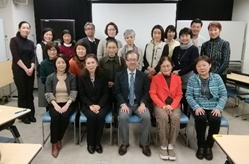
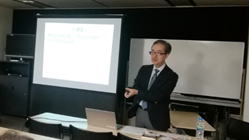
Mr. Shinich SHIBATA (center).
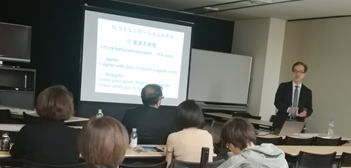
Mr. Shinichi SHIBATA
-Kanda University of International Studies, Professor, Career Education
Center.
-Presenter of NHK Radio "Business Communication in Simple English"
since 2015.
-Graduated from Master of Business Administration at University of London.
-Have 20-year overseas business experience in London, Dusseldorf and Frankfurt.
-Many books published, including “Intellectual Conversations in English” (2018, DHC).
January Medical/Healthcare English Communication Mini-Lesson
Mini-Lessons were held on 1/9 (Wed) Iidabashi-morning, 1/10 (Thu) Iidabashi-nighttime,
1/16 (Wed) Yokohama-morning, 1/21 (Mon) Fujisawa-morning, and 1/27 (Sun)
Sapporo-afternoon, respectively. The topic of warm-up CD listening was
“Artificial Intelligence (AI)” extracted from the book written by Mr. Shinich
SHIBATA (one of the books shown in the picture, the right side). Lesson
1 in January 2019 was for “(a) enteritis b) influenza", and the Chapter
1 was for "(a) gallstone、b) appendicitis ". Especially, we focused
on listening, reading, shadowing, and role -play to practice the dialogs
of influenza and appendicitis. Eeach material seems to be a little bit
difficult because of a quite long dialog in the scene. Let's challenge
with your pole-play partners together.
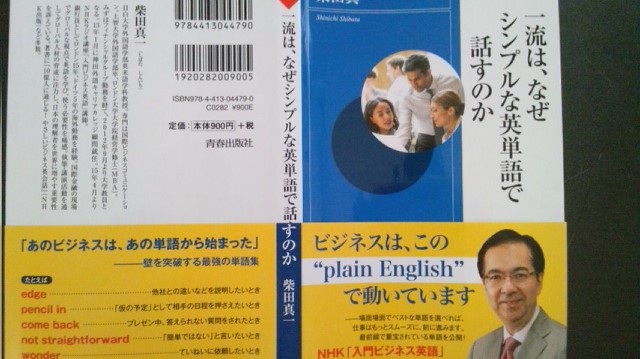
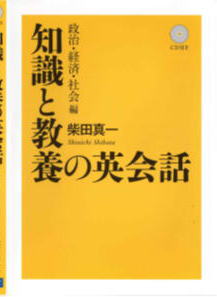
January Sports/Volunteering English Communication Mini-Lesson
Mini-Lessons were held on 1/11 (Fri) Fujisawa-morning, 1/23 (Wed) Iidabashi-morning,
1/24 (Thu) Iidabashi-nighttime, 1/27 (Sun) Sapporo-afternoon were held,
respectively. In 2019, we try to focus on the sports articles and materials
related to the official competition games among 2020 Tokyo Olympics and
Paralympics. And also we try to review Japanese traditional customs, annual
events, and Japanese foods in official ocasions as well as casual places.
In January mini-lesson, we learned about "men’s basketball: the basics
and an athelete's impressive story", "archery:the basics and
rules", "introducing o-Shogatsu/the New Year holidays",
and "describing Japanese New Year’s special dishes", while listening
CDs, reading, and practicing role-plays a lot.
[2018-December report]
☆MELSA would like to introduce one of the most impressive research papers
related to 2011 the Great East Japan Earthquake, tsunami, and the Fukushima
nuclear power plant disaster.
https://www.cambridge.org/core/journals/disaster-medicine-and-public-health-preparedness/firstview
Journal: Disaster Medicine and Public Health Preparedness. Title: Psychosocial Consequences Among Nurses in the Affected Area of the
Great East Japan Earthquake of 2011 and the Fukushima Complex Disaster:
A Qualitative Study. Authors: Hideko Sato, RN, MPH; Teeranee Techasrivichien,
PhD; Atsuko Omori, PhD;
Masako Ono-Kihara, PhD; and Masahiro Kihara, MD, PhD. About the Authors'
Affiliations: Department of Nursing, Tokyo Kasei University, Saitama, Japan
(Ms Sato), Department of Global Health and Socio-epidemiology, Kyoto University
School of Public Health, Kyoto, Japan (Drs Techasrivichien, Ono-Kihara,
and Kihara);
and, Medical English Learning Support Association, Tokyo, Japan (Dr Omori).
[ABSTRACT] Objective: The goal of this study was to assess the psychosocial consequences among
nurses affected by the Great East Japan Earthquake in order to identify
their coping strategies and explore possible
countermeasures against complex disasters. Methods: In 2012, we conducted a qualitative study and screened participants for
posttraumatic stress disorder (PTSD). Results: Thirty-eight nurses participated in this study. The result showed a relatively high proportion of probable PTSD (39%). Thirty-two conceptual codes emerged from the data and were grouped into 8 categories: “initial acute stress,” “acute stress turning chronic,” “chronic physical and mental fatigue,” “occupational stress,” “fear of the impact of radiation on children’s health,” “occupational satisfaction,” “positive influences of the disaster experiences,” and “impact of mutual care through interpersonal cognition.” Conclusions: The study reveals that mutual care may have a positive impact in assisting recovery and enhancing the psychological well-being of nurses. We suggest that disaster management should take into consideration the conflict between professional and family responsibilities. In the light of the
chronic impact of the nuclear crisis, enhanced support for interpersonal
relationships and human resources, as well as appropriate safety precautions,
is urgently needed to help affected nurses. (Disaster Med Public Health
Preparedness. 2018;page 1-8). Key Words: complex, disaster, psycosocal, consequences, self-condemnation, role conflict,
interpersonal relationships.
☆Collaboration Workshop "Have fun learning English" with NPO-AL
SIGN LAB and NPO-MELSA
"Medical/Healthcare English Communication for children with food allerggies"
it was held on December 26 in Yokohama. Children and mothers learned together
how to say foods caused allergies in English as well as how to express
conditions related to allergies in English when they travel abroad. Most
of children participants were at the age of elementary school. In addition,
they enjoyed singing together "Hello!", "Seven Steps",
"Head, shoulders, knees, and toes", and "Good-bye snowman!"
in English.
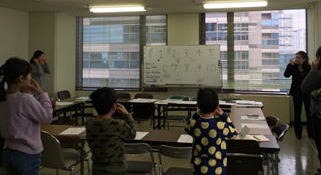
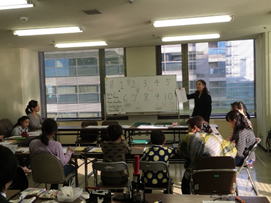
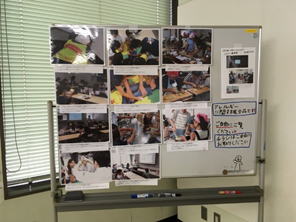
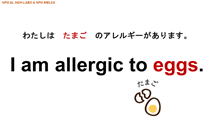
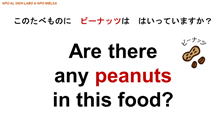
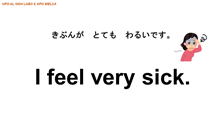





♪Special thanks to their supports and information: to improve expressions in English, especially for usage among small children:
Dr. Stacie Ward (a former MELSA lecturer), Ms. Jane Hsieh (a former MELSA
assistant), Ms. Siv Modler (a former medical staff of the pediatric department,
Stanford Medical Center in California US),
and Mr. Son Young Hwal (MELSA staff, lecturer).

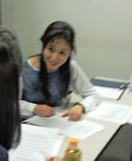
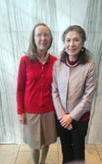
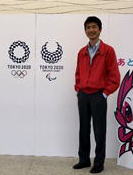
Dr. Stacie Ward (2015/7/15 Yokohama MELSA), Ms. Jane Hsieh ( 2016/2/3 Tokyo
MELSA (Hiroo),
and Ms. Siv Modler (2018/11/15-17 traveling in Kyoto and Tokyo, Japan),
and Mr. Son (2018/10/15 Fujisawa).
☆Dr. Mido's Special Seminar #4 in December
The special seminar by Dr. Mido Abdelhakim (MD) was held on December 22nd (Sat), 19:00-20:30. The title was "Immediate Management
of Sports Injury". It included various diagnostic imazings and information
related to common sports injuries during practice and/or games.
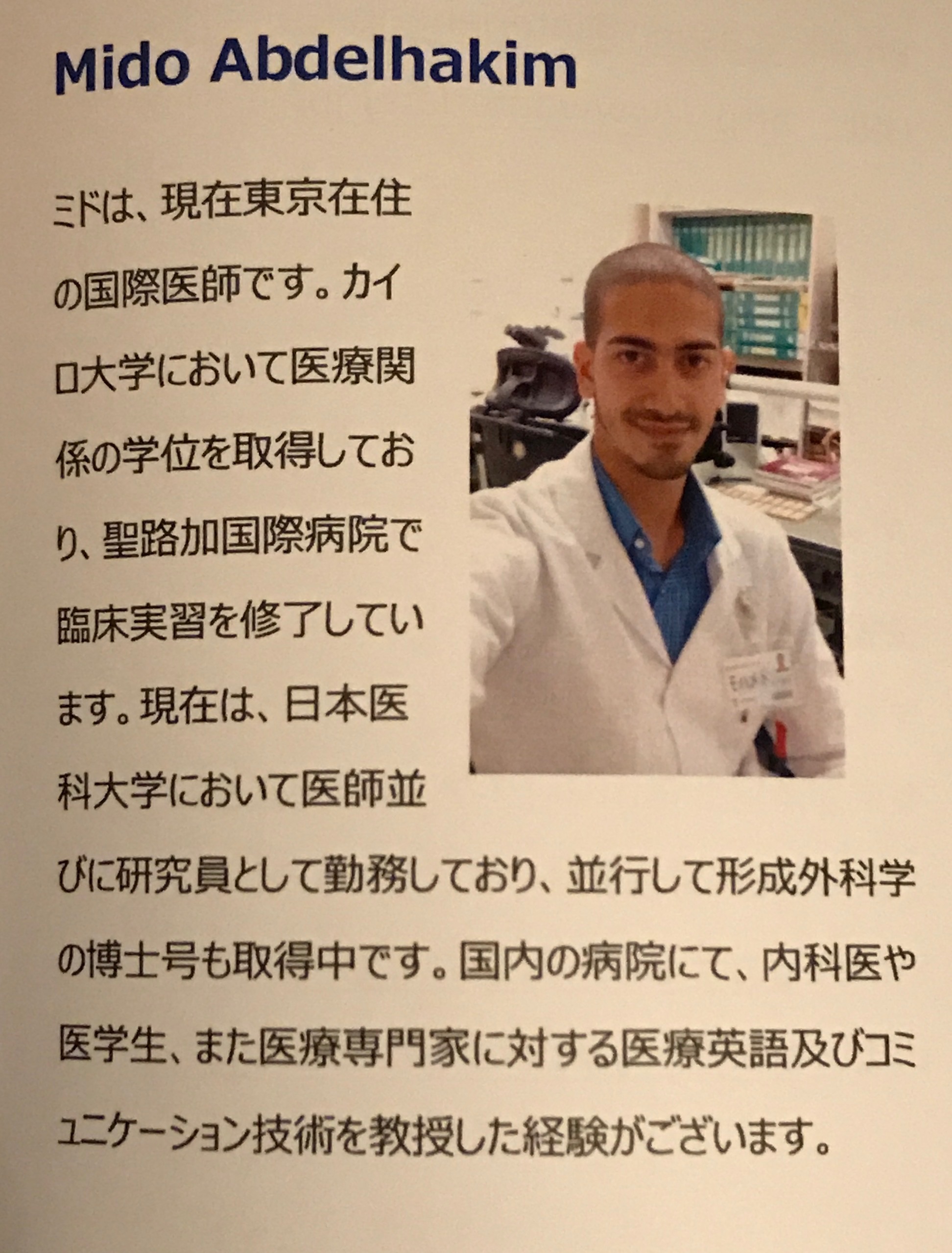

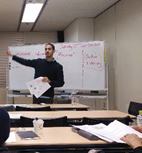


♪Special thanks to Mr. Robert KANE, helping role-play with Dr. Mido and
MELSA participants.
(Photos by Mr. Okamoto)
[Mr. Robert Steven Kane]
-English literature teacher, end of life care adviser
-Education: Middle Valley University, Middle Valley, Vermont
-Graduated English language course.
-St. Johns Fisher University, Rochester, New York.
-Acquired elementary and junior high school teacher license. May 1999
-Hospice Care Assistant Certified.
♪Special Seminar’s Digest Version (50 min) by Mr. Yoshihisa OKAMOTO♪
A 50-minute Digest Version Seminar will be held by Mr. Yoshihisa OKAMOTO
in Tokyo and Yokohama.
Contents are same in (1) and (2).
(1) Date & Time: 2018 December 13 (Thu), 19:00-19:50
Veneu: Iidabashi, Tokyo Volunteer Center 10 F, Room B (40 seats)
(2) Date & Time: 2018 December 19 (Wed), 9:45-10:35
Veneu: Kanagawa Kenmin Center (Yokohama), meeting room #703 (18 seats)
Title: Healthcare cost and Its structure in Japan
Lecturer: Mr. Yoshihisa OKAMOTO
-Researcher.
-Graduated from Gifu College of Pharmacy. Japan University of Economics
Graduate School, Pharmacy Management Institute.
December Medical/Healthcare English Communication Mini-Lesson
12/5 (Wed) Iidabashi-morning, 12/6 (Thu) Iidabashi-nighttime, 12/10 (Mon)
Fujisawa-morning, 12/16 (Sun) Sapporo-afternoon, 12/19 (Wed) Yokohama-morning
were held, respectively. Themes of warm-up CD listening were “24-hour hospital
opens near Fukushima plant” and “Smartphone Addiction”. In October, we
used the topic, “International experts discuss; gaming disorder” as one
of the problems among young generation. Also adults have to be careful
about excessive usage of it. The title of Lesson 12 was “Appointment as
an outpatient” following Chapter 12 titled “dermatology/ophthalmology/pediatrics”.
In addition, on 12/19 (Wed) Yokohama-morning, we combined a 50-minute Special
seminar by Mr. Okamoto as the digest version, which was held on July 28.
Title was “Healthcare cost and Its structure in Japan”. We also distributed
the articles in English, “Japan’s Universal Healthcare” and “Accepting
Overseas Medical Workers” to read.
December Sports/Volunteering English Communication Mini-Lesson
12/12 (Wed) Iidabashi-morning, 12/13 (Thu) Iidabashi-nighttime, 12/14 (Fri)
Fujisawa-morning, 12/16 (Sun) Sapporo-afternoon were held, respectively.
In addition, on 12/19 (Wed) Yokohama-morning, we combined a 50-minute Special
seminar by Mr. Okamoto as the digest version, which was held on July 28.
Title was “Healthcare cost and Its structure in Japan”. Among of warm-up
CDs listening, one was “Drone delivery starts in Fukushima” and the other
one was “Boxing; Basics and rules”. The reading -practice&role-play material
was “as an assistant of doping test”. We also read “prevention of a sudden
death” in Japanese. Then we reviewed how to use AED both in Japanese and
English. The last MELSA material for International exchange and communication
#10 was “favorite things; alcohol/cigarettes/coffee and sports” and the
last MELSA material for healthcare management #10 was “Disaster Nursing”.
We learned “MET tag”, which means a medical emergency triage tag. The colors
on it are divided into 4 colors; red, yellow, green, black. They have their
own meanings to assign degrees of urgency among a large number of patients
or casualties.



Sapporo in winter (2018/12/16) and in fall (2018/10/289
2018-November report
Symposium “Tokyo 2020 Olympic and Paralympic games”
All Japan-Enthusiastic movement toward “Festival and Culture” was held
on November 29 (Thu) afternoon.






Illumination aound the venue, Nihonbashi, Tokyo
The 29th Annual Meeting of the Japanese Society of Clinical Sports Medicine
Date: November 2nd (Fri) - 3rd (Sat)
Venue: Sapporo Convention Center
[The guest speaker’s lecture]
“Athlete Centred Olympic Physiotherapy Services Key Criteria and
Best Practice”.
Dr. Marie-Elaine Grant, PT Ph.D.
International Olympic Committee, Medical and Scientific Commission, Lausanne,
Switzerland/University College Dublin, Institute of Sport and Health, UCD,
Dublin, Ireland.
[Abstract in brief]
The protection of the health of the Olympic athlete is the core objective
of the IOC Medical Commission. During the Olympic Games the main venue
for medical service provision is the polyclinic, located in the Olympic
village. At previous Olympic Games physiotherapy and physical and physical
therapies services have been seen to be in high demand, providing treatment,
rehabilitation, injury prevention and recovery services for athletes, the
Olympic family staff and volunteers.
With increasing emphasis on prevention of injury and optimal support of
the Olympic athlete, the role of physiotherapy is now widely recognized
as being an essential part of the sports medicine team and the athlete’s
support structure. The Olympic Games provides a global platform for sports
physiotherapists, it is an exciting challenging and very valuable opportunity
for physiotherapists who form part of the host nation’s Physiotherapy team
and for many proves to be an experience of a lifetime.
This presentation aims to provide a better understanding of the athlete requirement of the physiotherapy and physical therapies services at the Olympic Village Polyclinic and competition venues at the time of Olympic Competition. This discussion will be based on the scientific evidence base, experience gained and data collection from previous Olympic Games. Including, key criteria which must be considered in order to effectively deliver services which are in line with best practice.
[Luncheon Seminar]
"Radial shockwave therapy, proved efficacy in daily practice"
BVBA Kinekabinet Vrijiders,Bert Vrijders.
[abstract, partially extracted]
Extracorporeal shock wave therapy (ESWT) has been successfully used for
over 20 years to manage a variety of orthopedic conditions. As a byproduct
of extracorporeal shock wave lithotripsy (ESWL), ESWT has emerged as an
acceptable and popular non-invasive management option for tendon and other
pathologies of the musculoskeletal system. This upcoming popularity of
extracorporeal shockwave takes part of the worldwide intention for using
less invasive, non-surgical alternatives for the treatment of musculoskeletal
indication.
Two types of technical principles are usually included in ESWT: focused ESWT (fESWT) and radial pressure waves (rSWT). These 2 technologies differ with respect to their generation devices, physical characteristics, and mechanism of action but share several indications. Especially radial shock wave is studied and used intensively throughout the world. rSWT not needing anaesteshia and fewer ultrasound guiding for correct targeting during treatment as well as needing less concomitant investigations, being well tolerated and being more cost efficient than fSWT. Conditions treated may need more treatments with RSWT. Scientific evidence proves that both rESWT and fESWT are comparable with respect to treatment outcomes. Clinical practice and scientific literature keep evolving towards better, more precise treatment parameters. Based on these insights, the exact indication (sports-related?) and the acutuality degree of the lesion the practitioner has to develop a tailor made intervention strategy for the patient.

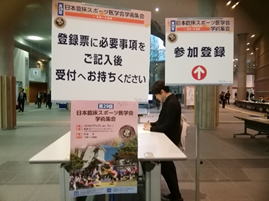
The 29th Annual Meeting of the Japanese Society of Clinical Sports Medicine
at Sapporo Convention Center.
2018-November MELSA
Ms. Mori's Special seminar (#4) [To improve medical/healthcare interpreting
skills]
It was held on November 16 (Fri) at Iidaba shi, Tokyo Volunteer Center.
The theme was "Orthopedics, Bones and Joints (1)". She prepared
a lot of materials as usual inorde to confirme and review medical terms
related to the skeletal and muscular system. And also we did a practical
interpreting role-play between two people .
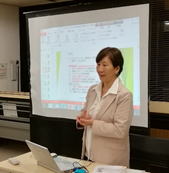
November Medical/Healthcare English Communication Mini-Lesson
11/7 (Wed) morning-Iidabashi, 11/12 (Mon) morning-Fujisawa, 11/15 (Thu)
nighttime-Iidabashi, 11/18 (Sun) afternoon-Sapporo, and 11/ 21 (Wed) morning-Yokohama
were held respectively. Warm-up CDs for listening practice were “New edition
of dictionary reflects social change” and “Disaster preparedness drill
held for foreigners in Tokyo”
November Sports/Volunteering English Communication Mini-Lesson
11/9 (Fri) nighttime-Iidabashi, 11/14 (Wed) morning-Iidabashi, 11/16 (Fri)
morning-Fujisawa, and 11/18 (Sun) afternoon-Sapporo wereheld respectively.
Warm-up CDs for listening practice were (1) “Ohtani hits first MLB homer”,
(2) “Olympic wrestling; basics and rules”, and “Do you know what sumo is
like?”. Also we used one of the materials as a role-play “volunteers
supporting at the judo event”. International exchange communication practice
for every day conversation was "(9) small talk keeping communication".
Healthcare management communication practice was "(9) occupational
Health Nursing". The words and phrasese focused on were mental health,
lifestyle-related diseases, work adjustment, passive smoking, and asbestos-related
lung cancer. Pole-Play practice were about “At the healthcare counseling
room; about sleeping problem”.
2018-October report
☆The 80th
Annual Meeting of the Japanese Society of Hematology
It was held on October 12-14 in Osaka.

[1 ] Tyrosine Kinase as a therapeutic target in hematologic malignancies.
Itaru Matsumura (Department of Hematology and Rheumatology, Kindai University
Faculty of Medicine, Japan).
--- Tyrosine kinases (TKs) are enzymes that transfer a phosphate group
from ATP onto tyrosine residue of the downstream substrates as signaling
molecules.
Point mutations and chromosomal translocation that cause activating mutations
of THs have been identified in hematologic malignancies as well as in solid
tumors; These mutant TKs cause various types of malignancies and/or critically
influence their disease characteristics as driver mutations. Thus, a number
of drug that target mutant THS have been developed and now widely utilized
in daily practice. Chronic myeloid leukemia (CML) is caused by a BCR-ABL
fusion gene, which is generated by the chromosomal translocation t(9;22)
(q34;q11). The prognosis of CML has greatly been improved by tyrosine kinase
inhibitors. (TKIs).
Most patients treated with TKI don’t progress and remain in chronic phase
as far as they continue TKI treatment. Although TKIs are unable to kill
CML stem cells in vitro, we found tht the number of CML stem cells gradually
decrease during TKI treatment using CML specific markers such as CD125
and CD225.
[2] Advancements in tyrosine kinase inhibitor therapy for chronic myeloid
leukemia: a path to treatment-free remission.
Naoto Takahashi (Hematol., Akita University, Akita, Japan).
--- Treatment-free remission (TFR) is proposed as a new goal in the treatment
of chronic myeloid leukemia (CML) with tyrosine kinase inhibitors
(TKI). Indeed, prospective trials suggest that imatinib therapy can be
successfully discontinued in patients with CML who have maintained a deep
molecular response (DMR). According to the results of clinical trials,
the TFR survival range was 40-65% in the STIM1 trial, TWISTER study, and
JALSG STIM213. Moreover, a second-generation TKI (2G-TKI) that followed
imatinib was also successfully discontinued. Although the TFR trials showed
that some CML patients could successfully stop TKI, unfortunately, a significant
population of patients experienced molecular recurrences. Moreover, some
patients achieved major molecular response (MMR) but not DMR, which is
the first milestone for TFR, even during long TKI treatments. Now the third
generation TKI is ponatinib.
Although vascular adverse events (VAEs) are known complications
[3] A possible role of tumor immunity against chronic myeloid leukemia
cells from the viewpoint of BCR-ABL1ttyrosinekinase inhibitor discontinuation
trials.
Jun Imagawa (Higashihiroshima Medical Center, Hiroshima, Jaapan) .
--- The latest data from imatinib discontinuation trials have shown that
TFR could be steadily maintained for almost 10 years, leading to substantial
clinical benefits, such as reduction in medical expenses as well as in
the long-term adverse effects caused by TKI treatment.
In the DADI trial, a high NK cell count during dasatinib treatment was
significantly associated with successful TFR. NK cell-based immune surveillance
appears to play an inimportant role in the cytotoxic activity against CML
cells. The control of CML cells after TKI discontinuation may be determined
by the balance between the growth kinetics of CML cells and tumor immunity
against CML cells. Employing new approaches targeting specific immune cells
would enable more CML patients to achieve TFR.
[4] Ex vivo platelet production from induced pluripotent
Naoshi SUGIMOTO, Koji ETO
Department of Clinical Application, Center ffor iPC Research and Appliction
(CiRA), Kyoto University, Kyoto, Japan.
Key words: iPS cells, Platelet, Megakaryocyte cell line, Clinical application.
---Platelet transfusion products derived from induced pluripotent stem
cells (iPSCs) hve been pursued as a blood donor-independent and genetically
manipulative measure to complement or as an alternative to current platelet
products.
Platelets are enucleate blood cells indispensable for hemostasis. Thus, platelet transfusions have been clinically established to treat patients with severe thrombocytopenia. However, current blood products face issues in the balance of supply and demand, alloimmune responses, and infections and are expected to meet the shortage of donors in aging society. iPSc-derived platelet products are qualitatively and quantitatively approaching a clinically applicable level, owing to advances ans novel findings in expandable megakaryocyte cell lines, turbulence-incorporating bioreactors, and reagents that enable feeder cell-free production and improve platelet quality.
Currently, the establishment of guideline to assure the quality of iPSC-derived
blood products for clinical application is in process. Considering the
low risk of tumorigenicity and the large demand, ex vivo production of
iPSC-derived platelets could lead to iPSC-based regenerative medicine becoming
a common clinical practice and the development of a future system in which
anyone can safely receive a platelet transfusion in their time of need.
2018-October MELSA
☆Special Seminar "Sports Medicine and Volunteering" by Dr. OZAKI
It was held on October 4th (Thu), 19:00-20:30 at the Iidabashi, Tokyo Volunteer
Center.
Dr. Daiya OZAKI(MD. , Ph.D.) gave us a lecture about "Sports &
Volunteering in the Olympic and Paralympic Games".

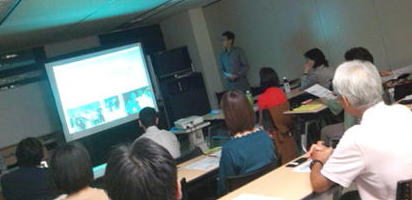
Almost half of the participants of the special seminar on 10/4.
Dr. Ozaki is a person in the center of the back row. Dr. Mido is a person
in the center of the front rrow.


Simulation a guided walking with wearing special eye glasses and holding
a white stick.




October Medical/Healthcare English Communication Mini-Lesson
10/9 (Tue) Iidabashi ?morning, 10/11 (Thu) Iidabashi ?nighttime, 10/15
(Mon) Fujisawa-morning, 10/24 (Wed) Yokohama-morning, and 10/28 (Sun) Sapporo-morning/Afternoon
were held respectively. Warm-up CDs for listening practice were "Nobel
Awards" and "Alzheimer’s Disease". The color orange is a
symbol color of Alzheimer’s Disease. September is a month of World Alzheimer’s
Disease. Lesson 10 was about urinary catheterization (1) (2). Chapter 10
was about cardiology / neurosurgery / neurology.

October Sports/Volunteering English Communication Mini-Lesson
10/16 (Tue) Iidabashi-morning, 10/18 (Thu) Iidabashi-nighttime, 10/19 (Fri)
Fujisawa-morning, and 10/28 (Sun) Sapporo-Aternoon were held respectively.
The everyday conversation of "International cultural exchange and
support" was "volunteering and circle activitie", including
how to spend one’s spare time and hobby. Also we did review, substitution
practicesasin during a pair-work. Healthcare management was about "community
healthcare and home medical care". Warm-up CDs were "Healthier
Fast Food" and "shooting event", including basics and an
athlete's episode. a topic was "volunteers in the medical support
team" as a dialog reading practice. We learned the most important
rules such as what to do as a volunteer in the medical support team.
2018-September report
☆Asahi World Forum 2018
“Asahi World Forum 2018” is the company’s annual flagship event. It was held on September 24th/25th/
26th in Tokyo, Japan. The main theme for 2018 is “Commitment to
Future Generation --- Building a more tolerant Society”. Domestic and overseas
experts, policy makers, government officials, businesspeople and NPO members to
participate in sessions to be held over three days fo in-depth ddiscussion on
measurements to realize a tolerant society that overcomes conflict and
discrimination

9/24 (Mon) Opening
[Remarks by Guest of Honor] Hiroki Nakanishi: Chaiman of KEIDANREN (Japan Business Federation), Executive
Chairman of Hitachi, Ltd.
[Lecture] Yuriko Koike: Governor of Tokyo
"Making Tokyo a Sustainable and Environmentally Progressive City"
September 24th
Atarashii Time---Exploring Craftsmanship from Japanese and Global Perspectives.
Eriko Yamaguchi: Chief Executive Officer and Chief Designer of MOTHERHOUSE
Co., LTD. Eriko Yamaguchi’s MOTHERHOUSE produces bags, accessories and
other items in developing countries such as Bangladesh, Nepal, Indonesia,
Sri Lanka and India. Moderator, Ryan Takeshita (Editor in Chief, HuffPost
Japan) asked her what she values in her craft work and business and explore
the future of Japan’s craftsmanship.
September 25th [Panel Discussion]
Women Explore Future Innovation---What kind of Leadership Do We Need Now?
Kathy Matsui (Vice Chair, Goldman Sachs, Japan Co., Ltd. Miki Iwamura (Managing
Director APAC CMO Japan. Google) Haruno Yoshida (Former Adviser, BT Japan
Corporation, Member for Regulation Reforming Council Co-Chair for W20 of
G20 Advisory Council for Women in 2019. Japan faces the challenges of globalization
and a declining population. In order to survive in the world, innovation
that creates new value is indispensable. Innovation requires diversity,
which should be about wide-ranging values held by people beyond gender,
nationality and other attributions. Three female panelists were invited
to discuss women’s leadership from global perspectives.
September 26th [Panel Discussion] A Future Brought about by AI Speech Translation---Beyond “Language” and
“Mind” Barriers.
☆Tokyo International Sports Medicine Innovation Forum
"Japan Way in Sports Medicine beyond 2020".
It was held on September 22th in Shinjyuku, Tokyo. One of the most interesting
presentations was “Clinical Trial about the Therapeutic Use of Platelet-rich
Plasma (PRP) for the Treatment of Acute Muscular Injuries in Football Players”
. The details are as follows.

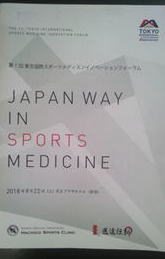
[Tokyo International Sports Medicine Innovation Forum Japan Way in Sports
Medicine beyond 2020]
The concept, three “i”, stands for [International], [Innovative], and [Interactive].
[Symposium]
Establishing Safety Environment in Sports, Yutaka Saho (Sports Safety Japan,
Representative).
--- Although the awareness of safety in sports has been increasing, there
is no clear guideline issued in Japan. Most fatal accidents and catastrophic
injuries in sports are Sudden deaths (Cardiac arrests), Head/Neck injuries,
and Heat strokes. The safety environment in sports must be established
by 3 pillars of actions, 1) Learning (personnel), 2) Installing (Equipment),
3) Planning (Emmergency Action Plan). Preparation is more important than
reaction in emergency situation, therefore the safety environment must
be established in advance regardless of the levels or types of sports.
[Lunch Discussion]
The future prospect of arthroscopic knee surgery.
Mae Tatsuo (Osaka University Graduate school of Medicine, Orthopaedic
Surgery).
--- Anterior cruciate ligament (ACL) rupture is one of the most common
injuries in the sports trauma. Ligament reconstruction is generally performed
for ACL injury. Thanks to advancement in anatomical studies and improvement
of instruments, reconstructive graft is biomechanically and morphologically
close to the normal ACL, and furthermore, most players can return to the
previous sports activity level. However, many unsolved problems remain
such as graft rupture, tunnel enlargement, long sports-restricted period,
graft harvest site morbidity, and muscle weakness. Some problems can be
improved by brush-up of rehabilitation program and use of bone-patellar
tendon-bone graft, allograft or artificial ligament completely different
from the conventional ones. Now, I expect an up-coming biological break-through
for graft remodeling, though there are no remedies for early return to
play.
[Panel Discussion] “PRP”
Clinical trial about the therapeutic use of platelet-rich plasma (PRP) for the treatment of acute muscular injuries in football players.
Javier Gonzales Iglesias, Natalia Burgos, Jose Antonio Lekue, Isabel Andia Hospital de Urduliz, Athletic Club de Bilbao .
【Background】Our body has the capacity to heal or improve an injury with
the platelets. And every platelet has hundreds of molecules, like cytokines
and growth factors, taking action in this process. Platelets Rich Plasma
could promote proliferation and migration of skeletal muscle cells.
【Purpose】To evaluate the effects of PRP injection in muscle injuries. We
check football players in the acute phase of hamstrings or quadriceps injuries.
【Study design】Randomized clinical trial.
【Methods】38 football players were included in our study, We used randomly PRP injection or a homeopathic product in muscle injuries (hamstrings or quadriceps), in the early stage (first 48-72 hours). One week later, we do a second infiltration with the same product, always ultrasound guided. 3-4 weeks after the injury, we check different variables to evaluate the ability return to play: ultrasounds for the injurie, self-perception test, muscle strength, flexibility, jump, run. Furthermore, we evaluate the pain and the recurrence rate.
【Results and conclusion】We will show the preliminary results in the first
Tokyo international Sports Medicine Innovation Forum.
2018-September MELSA
☆Dr. Mido's Special Seminar #3 in September
We are very sorry that all the seats were immediatly reserved. Thank you
for your understanding.
His special seminar was held on September 22nd (Sat), 19:00-20:30.
The title was "An Introduction to Musculoskeletal System". It
included lots of information related to structures, functions, and common
injuries while playing sports.

[Profile: Dr. Mido Abdelhakim, MD]
-International medical doctor at department of Plastic and reconstructive surgery of Nippon Medical School Hospital.
-Graduate of Cairo university, Egypt.
-Completed clerkship at St.Luke's international hospital, Tokyo.
-joined the graduate school of Nippon Medical School, Mechanobiology and
mechanotherapy Laboratory.
-part time lecturer and Medical English and communication class instructor,
NMS.
September-Medical/Healthcare English Communication Mini-Lesson
9/3 (Mon) Fujisawa-morning, 9/5 (Wed) Iidabashi-morning, 9/6 (Thu) Iidabashi-nighttime,
9/18 (Tue) Yokohama-morning, 9/24 (Sun) Sapporo-morning/ -evening. Warm-up
CD listening (1): “Earthquakes in Japan”. The Japanese word “Shindo” or
seismic intensity scale is unique to Japan. Magnitude, which is also called
“Richter scale”, and Shindo scale do not correspond to each other. Warm-up
CD listening (2): “Recovering from natural disasters”. There were the triple
disasters of the earthquake, tsunami and nuclear meltdown in Japan in 2011.
It’s taking many northeastern Japanes communities a long time to get back
on their feet. Getting things back the way they were before isn’t something
you can do overnight. Lesson 9 was “Observation after Operation (1) (2)”.
Chapter 9 was “Respiratory System / Endocrine System”. (Sapporo-MELSA Medical/Healthcare)
Warm-up CD listening (1): A Japanese word “Umami” roughly means “delicious
flavor”. It’s the fifth primary taste element after sweet, sour, salty
and bitter. In fact, “Umami” has become part of the English vocabulary.
Soy sauce, for example, is rich in umami components. Warm-up CD listening
(2): “Healthier Fast Food”. The dish is aimed at diners who want fewer
carbohydrates. One of the largest first-food restaurants has replaced the
rice in certain dishes with noodles made from a high-fiber, low-calorie
vegetable called konnyaku.
September-Sports & Volunteering English Communication Mini-Lesson
9/7 (Fri) Fujisawa-morning, 9/12 (Wed)
Iidabashi-morning, 9/13 (Thu) Iidabashi-nighttime, 9/24 (Sun)
Sapporo-afternoon.
(B) Healthcare


[9/24 in Sapporo] a special event for supporting people in a stricken area
by the earthquake on September 6th.
2018-August MELSA
August-Medical/Healthcare English Communication Mini-Lesson
In August, each class was held on 8/1(Wed) Tokyo-morning, 8/2 (Thu) Tokyo-nighttime,
8/6 (Mon) Fujisawa-morning, 8/22 (Wed) Yokohama-morning, and 8/26 (Sun)
The theme of Lesson 8 was “Taking the patient into surgery
August-Sports & Volunteering English Communication Mini-Lesson
Eeach class was held on 8/8 (Wed) Iidabashi-morning, 8/9 (Thu) Iidabashi-nighttime,
8/10 (Fri) Fujisawa-morning, 8/26 (Sun) Sapporo-afternoon. In the first
lesson, the theme was “talking about public facilities and residential
areas”. The first warm-up listening topic was “Genealogy Tourism; mid-August
in Japan is “Obon”. In the second lesson, the theme was "“Healthcare;
diseases and injuries". The second warm-up listening topic was “Swimming;
(1) the basics / (2) about a swimming refugee”. In addition, we practiced
reading materials and played a role related to the dialogs at a reception
desk and in the consultation room in the hospital
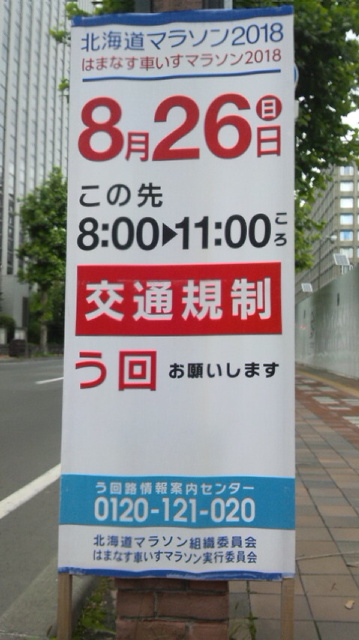
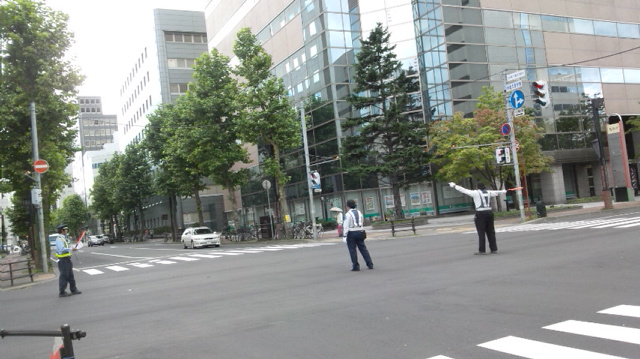
2018-July
"Mr. Okamoto's Special Seminar"
It was held on July 28 (Sat), from 19:00 to 20:30. Theme was "Healthcare
system and its cost in Japan". The typhoon #12 was just coming to
Tokyo in the evening. Even though that, Mr. Okamoto gave us very useful
and informative lecture. We had a great time to get together at that night.
He prepared a lot of slides in English in order to explain the basic knowledge
of Japanese health insurance system and its cost, including technical terms
list written in both Japanese and English.
[Mr. Yoshihisa OKAMOTO]
-Graduated from Gifu College of Pharmacy.
-Qualified as a pharmacist, 1st kind environmental health manager(nation
-Researcher, Japan University of Economics Graduate School, Pharmacy Management
Institute.
-Office worker at a pharmaceutical company.
-Part time lecturer at school of medicine, Nagoya municipal university.
-Qualified as a pharmacist, 1st kind environmental health manager(national
license).
-Licensed for medical institute management(2nd grade ; private license).
July-Medical/Healthcare English Communication Mini-Lesson
In July, each lesson was held on 7/4 (Wed) Tokyo-morning, 7/5 (Thu) Tokyo-nighttime,
7/6 (Fri) Fujisawa-morning, 7/22 (Sun) Sapporo-morning & -afternoon, and 7/24 (Tue) Yokohama-morning, respectively. In Lesson 7, the theme was “Orientation for Operation (1) (2)” and the first warm-up listening topic was “Method Developed to Detect Street Levels in Dogs”. In Chapter 7, we learned “Microbiology / Immune System”. The second warm-up listening topic was “Post-operative Interview: Anti-biotics Administration”. We learned a lot about dialogs between a patient and a pharmacist in different scenes, including during the hospitalization, at a dispensing pharmacy and an OTC counter.
July-Sports & Volunteering English Communication Mini-Lesson
In July, each lesson was held on 7/11 (Wed) Iidabashi-morning, 7/12 (Thu)
Iidabashi-nighttime, 7/13 (Fri) Fujisawa-morning, 7/22 (Sun) Sapporo-afternoon.
In the first material, the theme was “how to express one's emotion”, such
as expressing joy/happiness, anger, sadness, and pleasure”. The warm-up
listening topic (1) was about “Tokyo Police Brush Up English”. In the second
material, the theme was "parts and organs of the body” and "explaining
contents and direction of medicines prescribed”. Next, warm-up listening
topic (2) was “Artistic Swimming”. As you may know, the old name “Synchronized
Swimming” has been changed into “Artistic Swimming” since July 2017 worldwide
and since April 2018 in Japan following the IOC policy.
Lecture "Tea Ceremony" (called "Chado" or "Sado"
in Japanese)
This lecture was held as an open lecture for people at Asahi Culture Center Yokohama. It was held on WednesdaynJuly 18th. The lecturer was PhD. Kinuko TAKAHASHI. She is a qualified interpreter in English. She said that Tea Ceremony was
one of the most popular Japanese cultures among foreign tourists. Tea Ceremony
is a kind of ritual where a host entertains guests by making a bowl of
tea based on special manners. She taught us that learning how to entertain
guests by making a bowl of tea means learning Japanese hospitality as well
as manners and etiquettes of rituals of tea ceremonies.
[Title: Explaining Tea Ceremony Through English Conversation]
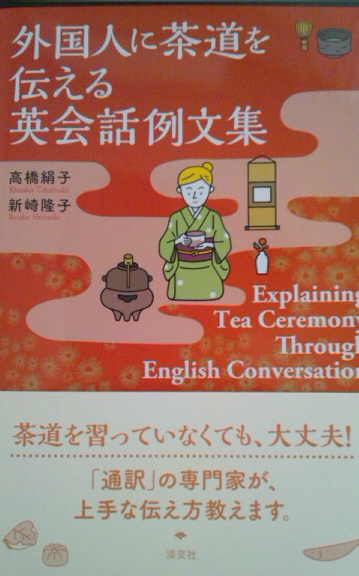
Lecture "The latest treatmend for Osteoporosis"
The lecture about "Osteoporosis" was also held at the same venue
on Monday, July 16th. The lecturer was Dr. Kiyokazu TANAKA from the Rehabilitation
Center of JR Tokyo General Hospital. The summary of the lecture is as follows.
Osteoporosis is a condition in which reduced bone mass makes the patient
more susceptible to broken. An imbalance between bone formation and
bone resorption is the main cause of osteoporosis.
*To prevent fracture, balance exercises, a calcium- and vitamin D-rich
diet, and fall prevention measures are needed as well as elimination of
the normal risk factors.
*Treatment: There are now many medicines available to improve a condition
of osteoporosis. These include calcium, vitamin D, calcitonin (which decrease
bone resorption), bisphosphonates (which prevent the loss of bone mass),
selective estrogen receptor modulators (SERM), and hormone replacement
therapy (the long ?term use is controversial).
2018-June
Ms. Mori's Special seminar (#3)[To improve medical/healthcare interpreting
skills]
It was held on June 29 (Fri) at Iidaba shi, Tokyo Volunteer Cente. The theme was "Respiratory system", including the general knowledge,
rules, instructions, and some hints for practical interpreting.
June-Medical/Healthcare English Communication Mini-Lesson
In June, each lesson was held on 6/6 (Wed)Tokyo-daytime , 6/7(Thu)Tokyo-nighttime,
6/8(Fri) Fujisawa-morning, 6/24(Sun) Spporo-morning & afternoon, 6/27(Wed)
Yokohama-morning, respectively.
The Lesson 6 was "general care of patients; drawing a blood sample"
. The Chapter 6 was "physiology / pathology, urology" . Warm-up
Listening themes were "Is the computer our friend or our rival?"
and "Amazing things happen when brains and technology are combined".
Both topics were related to AI (artificial intelligence).
June-Sports & Volunteering English Communication Mini-Lesson
Each lesson was held on 6/13(Wed)Tokyo-daytime, 6/11 (Mon) Fujisawa-morning,
6/14(Thu) Tokyo-nighttime, and 6/24(Sun) Spporo- afternoon, respectively.
The theme of "International communication" was for “expressions
to praise and admire/apologze/advice" . The theme of "Healthcare"
was for “illness, examination, treatment”, including a complete medical
checkup. Warm-up Listening themes were “Conversation;the fall, hospitalization,
and physical therapy" and "Trampoline; the basics and the rules
of the games".
2018-May
Dr. Mido's Special seminar for English medical/healthcare Communication
#2
It was held on Saturday, May 12 at Iidabashi Tokyo Volunteer Center.

Profile: Mido Abdelhakim, MD
-International medical doctor at department of Plastic and reconstructive
surgery of Nippon Medical School Hospital
-Graduate of Cairo university, Egypt.
-Completed clerkship at St.Luke's international hospital, Tokyo
-joined the graduate school of Nippon Medical School, Mechanobiology and mechanotherapy Laboratory
-part time lecturer and Medical English and communication class instructor, NMS
Presentation title:The topic will be " Intercultural collaboration- breaking the ice and building bridges".
The seminar idea is about Japanese researchers, medical professionals, and students who travel abroad, what social skills they need to share ideas, make connections and expand their knowledge.
May-Medical/Healthcare English Communication Mini-Lesson
In May, each lesson was held on 5/9 (Wed)Tokyo-daytime ,5 /10(Thu)Tokyo-nighttime,
5/14(Mon) Fujisawa-morning, 5/27(Sun) Spporo-morning & afternoon, 5/30(Wed)
Yokohama-morning, respectively.
The themes of Lesson 5 and Chapter 5 were "General Care of Patients
(1)(2)" and "skeleton & muscular system / nervous system
& endocrine system". The first warm-up Listening CD title was
“Let’s go by taxi-no driver needed!” It was the topic that some of the
public would be able to test self-driving taxis in Singapore. The other
one was “What happens when you combine robots and living cells?” The latter
topic included many medical technical terms, such as muscle tissue, skeleton,
lifespan, nutrient, and function, etc. The material for Reading
practice was “Lower back pain often treated incorrectly, research finds”. This article was about opioids, which are painkillers that can be addictive.
May-Sports & Volunteering English CommunicationMini-Lesson
In May, 5/16(Wed)Tokyo-daytime, 5/21(Mon) Fujisawa-morning, 5/24 (Thu)Tokyo-nighttime,
and 5/27(Sun) Spporo- afternoon, respectively. "International communication"
was for “Season’s Greetings/weather forecast/favorite seasons/conversation
in the hospital”. "Healthcare" was for “physical strength/stamina/health
and condition [shape]”. Warm-up Listening CDs were used for "India
swelters under record", "Crazy Weather/ Cherry Blossom Viewing
Party", and "Table tennis (the basics/ the rules of the game)"
in the sports theme.
2018-April
Special seminar for improving skills of medical/healthcare interpreting
It was held on Thursday, April 19 at Iidabashi Tokyo Volunteer Center.
Mrs. Mori gave us the very useful methods and techniques how to take notes
during medical/healthcare interpreting. We practiced doing that using you-tube
about diabetes.
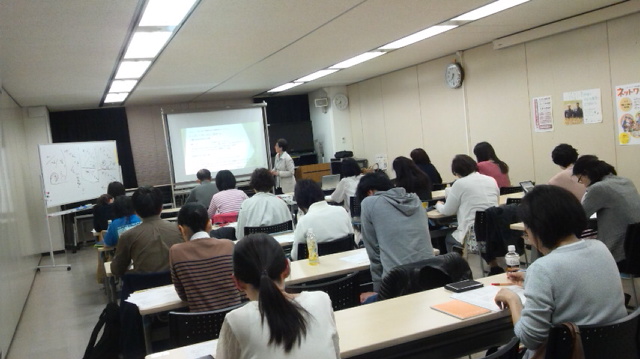
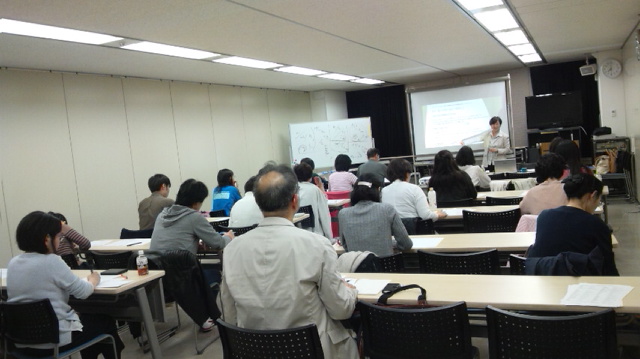
April-Medical/Healthcare English CommunicationMini-Lesson
In April, each lesson was held on 4/4 (Wed)Tokyo-daytime, 4/5(Thu)Tokyo-nighttime,
4/9(Mon) Fujisawa-morning, 4/23(Sun) Spporo-morning & afternoon, 4/25(Wed)
Yokohama-morning, respectively.
The themes of Lesson 4 and Chapter 4 were "Meeting the patient (3)
(4)" and "Terms for surface anatomy and organs". This month,
we focused on reading aloud and recitation of dialog sentences. The practice
is based on the theory of short-term memory and lomg-term memory. Warm-up
listening topics were "Returning Japanese face less time in line"
and "Japanese astronaut, Norishige Kanai, boards space atation".
His experiments includes making protein crystals to help understand the
mechanism of Alzheimer's disease. And also he studies the effects of zero
gravity and radiation on the human body.
April-Sports & Volunteering English Communication Mini-Lesson
In April, 4/11(Wed)Tokyo-daytime, 4/12 (Thu)Tokyo-nighttime, 4/16(Mon)
Fujisawa-morning, 4/23(Sun) Spporo- afternoon, respectively. From this
April, the first period theme is for "International communication"
and the second period is for "Healthcare". We studied "general
greetings and introduction each other" and "expressions about
figure, shape, and changes in the body". Warm-up listening topics
were "Self-introduction on the first day in a new department",
"Ohtani eyes major leagues", and "the basic knowledge about
golf". You can visit the Organizing Committee Web Site and collect
details about the Olympic/Paralynpic events.
2018 Hirosaki Sakura Matsuri: Cherry blossom viewing
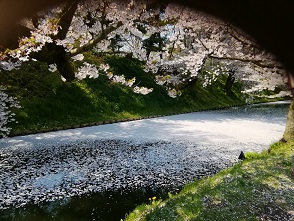
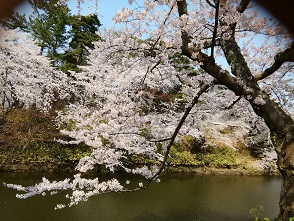
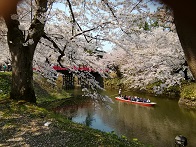
"Hana-Ikada", cherry blossom petals floating on the water, is
now famous worldwide.
(2018.4.26 photos by Omori)
2018-March
Dr. Mido's Special Seminar
Dr. Mido's Special Seminar was held on Saturday, March 10th in Iidabashi
Tokyo Volunteer Center. This seminar is for better medical/healthcare communication
in English. He shared us the most important seven elements how to communicate
during the patient encounterment in a clinic.
March-Medical/Healthcare English Communication Mini-Lesson
In March, each lesson was held on 3/1 (Thu) Tokyo-nighttime, 3/14 (Wed)
Tokyo-morning, 3/22 (Thu) Fujisawa-morning, 3/25 (Sun) Sapporo-morning
& afternoon, and 3/28 (Wed) Yokohama-morning, respectively.
The themes were Lesson 3 “Meeting the patient (1)(2)" and Chapter 3 "Word Formation
and Medical Terms).
During the lesson 3, we used the floor map of a hospital ward and did a
pair-work how to show the direction. And also We studied two kinds of topics
for Warm-up listening, one was “Deadly insect found again” and the other
was “Doctors on board (5)” , just in case of a medical emergency when a
plane is in flight.
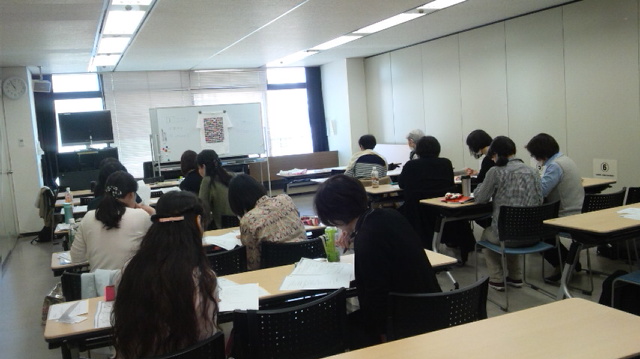
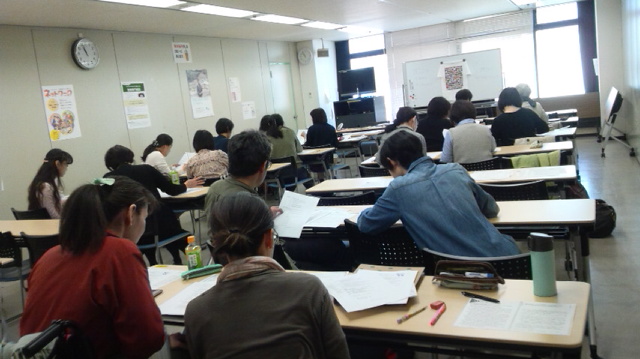
Tokyo MELSA, Iidabaashi morning class: Medical/Healthcare English Communication
lesson
March-Sports & Volunteering English Communication Mini-Lesson
Each lesson was held on 3/6 (Tue) Tokyo-morning, 3/14 (Wed) Tokyo-morning,
3/22 (Thu) Fujisawa-morning, 3/25 (Sun) Sapporo-afternoon, respectively. Themes of March were "Various kinds of hobbies and Japanese board
games;Go (Igo)and Shogi" and "Complementary and Alternative Medicine
(CAM) (6)" , including the Orthopedics, the Bonesetter's office, the
Physical therapy (PT), and the Shiatsu massage clinic. Topics for warm-up listening practice were "Japanese teenage Shogi
prodigy sets record" and "the Oriental Witches; Japanese women
volleyball team in the Tokyo 1964 Summer Olympics".
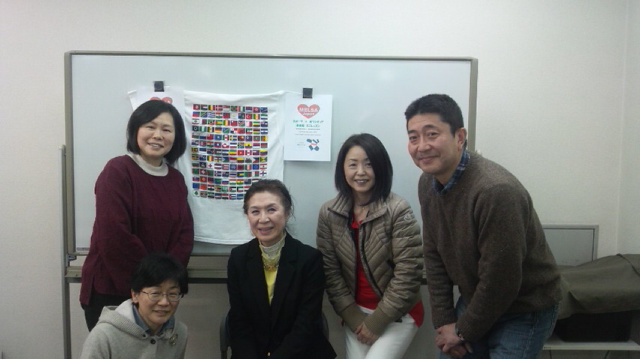
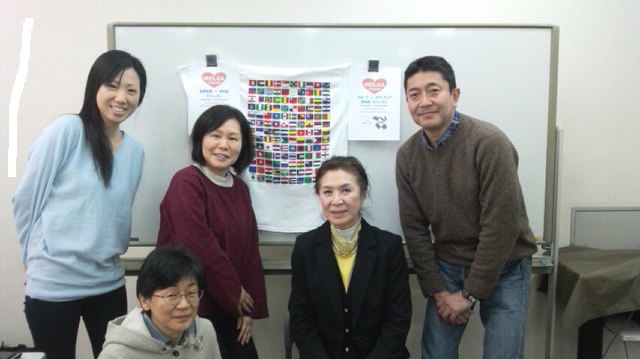
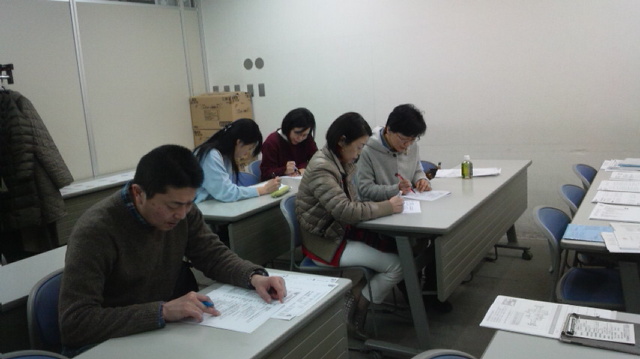
Shonan MELSA, Fujisawa: Medical/Healthcare and Sports & Volunteering
English Communication lessons
2018-February
Special seminar for improving skills of medical/healthcare interpreting
It was held on Thursday, February 15th in the Iidabashi, Tokyo Volunteer
Center. Mrs. Mori gave us the excellent and informative methods how to
improve the skill of medical/healthcare interpreting.
February-Medical/Healthcare English Communication Mini-Lesson
In February, each lesson was held on 1/31 (Wed) Tokyo-morning, 2/1 (Thu)
Tokyo-nighttime, 2/22 (Thu) Fujisawa-morning, 2/25 (Sun) Sapporo-morning,
and 2/28 (Wed) Yokohama-morning, respectively. We learned “Emergency Department”
(3) ( 4) as for Lesson 2, “medical terminology and lay terms as a Chapter
2.
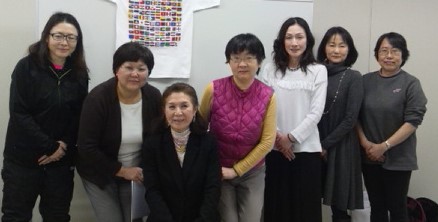
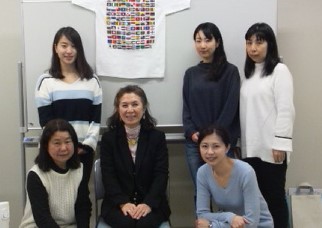
Sapporo MELSA: morning and afternoon class, Medical/Healthcare English
Communication lesson
February-Sports & Volunteering English CommunicationMini-Lesson
Each lesson was held on 2/8 (Thu) Iidabashi-nighttime,
2/13 (Tue) Iidabashi-morning, 2/22 (Thu) Fujisawa-afternoon, 2/25 (Sun)
Sapporo-afternoon.The first period was for Sports
material; baseball, soccer, and golf. The second period was about Complementary
and Alternative Medicine.
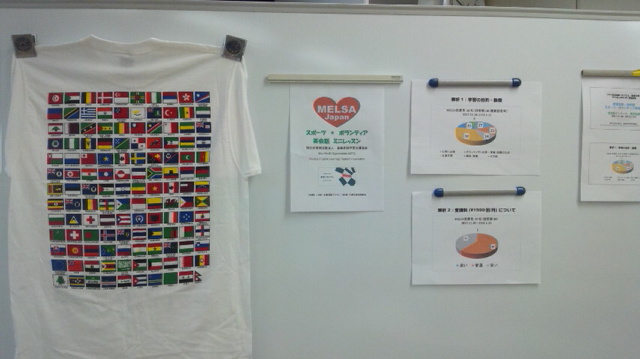
2018-January
January-Medical/Healthcare English Communication Mini-Lesson
January' s classes were held as follows; 1/16 (Wed) Tokyo-daytime, 1/18
(Thu) Tokyo-nighttime, 1/22 (Mon) Shonan Fujisawa-daytime, 1/24 (Wed) Yokohama-Morning,
and 1/28 (Sun) Sapporo-Morning & Evening. THe theme of Lesson 1 is
"emergency department" including 1) reception desk, 2) examination
room. The theme of Chapter 1 is "acronyms and abbreviations"
and "medical ethics/primary care". The warm-up Listening topics
are "world First' Clinical Trial Begins" and "Doctors on
Board". Those topics include a lots of medicaal/healthcare words and
phrases we learrned last year.
January-Sports & Volunteering English CommunicationMini-Lesson
January' s classes were held as follows; 1/09 (Tue) Tokyo-daytime, 1/11(Thu)
Tokyo-nighttime, 1/ 22 (Mon) Shonan Fujisawa-nighttime, 1/28 (Sun) Sapporo-Afternoon.
Themes are "8) fishing, skiing, golf as outdoor sports"
and "4) questionnaire at a clinic". Reading practice/dialog is
"how to apply for volunteer jobs at the sports competition".
The warm-up Listening topics are "Marathon: the basic knowledge and
history", and words and phrases are "bobsleigh/luge/skeleton".
The purpose of this lesson is to learn English communication for small
talk.
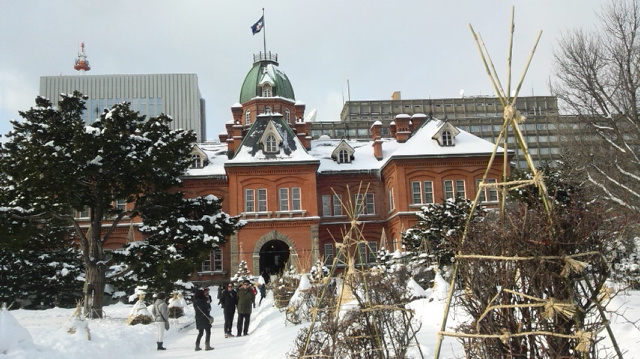
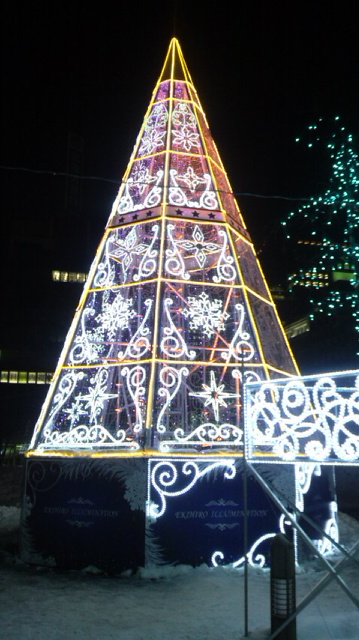
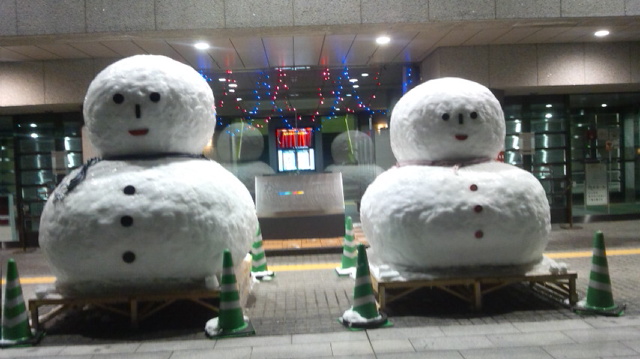
[photos from Sapporo city in winter 2018]
2017-December
December-Medical/Healthcare English CommunicationMini-Lesson
December’s classes were held as follows; 12/06 (Wed) Tokyo-daytime, 12/07
(Thu) Tokyo-nighttime, 12/20 (Wed) Yokohama-Morning, and 12/17 (Sun) Sapporo-Morning
& Evening. Lesson 12 was "Assisting an infant patient with tests"
, and Chapter 12 was “The immune System”. As well-known, immune system
has two types; natural immune system and acquired immune system. The warm-up
Listening topics were “Staying sharp” and “Sugar intake leads to a large
release of dopamine.” We also used “Morning Rituals: Physical exercise
is great brain exercise, too.” as a reading material. To avoid foods with
high sugar content could be nice for keeping healthy.
December-Sports & Volunteering English Communication Mini-Lesson
December’s classes were held as follows; 12/13 (Wed) Tokyo-daytime, 12/14(Thu)
Tokyo-nighttime, 12/17 (Sun) Sapporo-Morning, and 12/21 (Thu) Shonan Fujisawa-nighttime.
December’s themes of Sports and volunteering English were "table tennis
and volleyball" and "Chief Complaints (CC) about pain" as
the complementary and alternative medicine (CAM)No. 3. Warm-up listening
topics were as follows; "New taxis in Japan to be bigger, more accessible.”
and “A pollution may cause torrential rain.” As a conversation practice
in pairs, “English ability and mindset”. The impressive phrases were "The
importance is whether or not you can communicate." and "You should
have the courage to try being a volunteer."
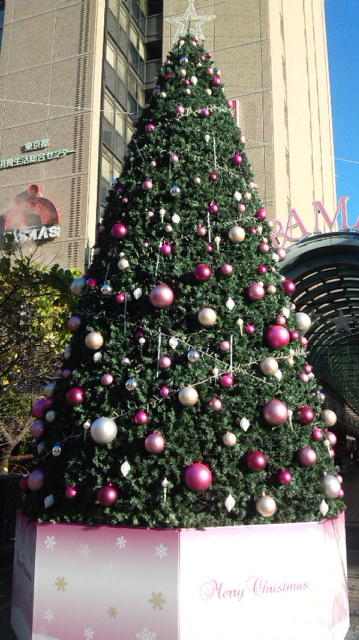 [Xmas tree in front of the IIDABASHI venue in December 2017]
[Xmas tree in front of the IIDABASHI venue in December 2017]
2017-November
The 28th Annual Meeting of the Japanese Society of Clinical Sports Medicine
It was held on November 18th-19th. The lecture of a guest speaker: ”Emergency
Medical Services Provision at the Olympic Games” by David Anthony ZIDEMAN,
International Olympic Committee Medical and Scientific Committee Games
Group.
[Abstract]
-In the summer of 2012, London hosted the Olympic and Paralympic Games.
-From 25th July to 12th August, 10,566 Olympic athletes from 204 National Olympic Committees competed in 26 sports in 33 competition venues.
-Two weeks later, 4237 athletes from 164 Nations competed in 20 sports
in 21 competition venues, the largest Paralympics ever.
-Medical services was a subdivision of the Sport Directorate.
-The aim of the medical services was to provide an accessible high quality
and comprehensive medical service to all Games client groups.
-Medical services were further divided into seven sections (emergency medical services, sports medicine, polyclinic, physical therapies, pharmacy and radiology) each headed up by a clinical lead.
-The emergency medical services had two primary client groups, field of
play and spectator, both subject to individual international sport regulations
and national Safety Guides.
-Detailed planning required the derivation of a safe and efficient service from scratch with:
1) Service design and function planning
2) The derivation of standard operating procedures for all sports and venues
3) Equipment specification and training of volunteers
4) Drug specification and ordering
5) Recruitment. Section and training of volunteers
6) Clinical governance
7) Ambulance and transportation planning
8) Data reporting
9) Major incident planning
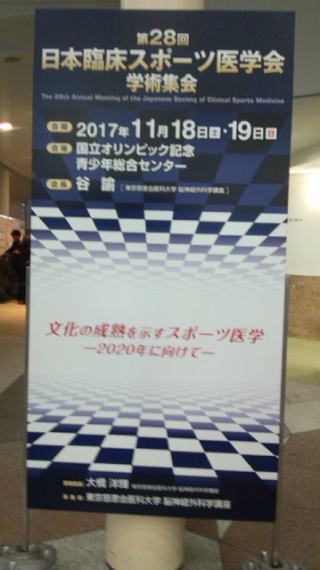
November-Medical/Healthcare English Communication Mini-Lesson
November’s classes were held as follows; 11/2 (Thu) Tokyo- nighttime, 11/10
(Fri) Tokyo-daytime, 11/15 (Wed) Yokohama- morning, 11/26 (Sun) Sapporo-morning
& evening. Lesson 11 was “Assistant for delivery and child-care guidance”
and Chapter 11 was “The Reproductive System (Female)”. Warm-up Listening
topics were as follows; “Are you an early bird or a night owl?” and “Workers
in Contaminated Room for 3 hours”. As for an an early bird, having the
right DNA can make a difference between a night owl and an early bird.
However, genes are only one of many factors. The former article has many
words and phrases we have learned, including genome, suffering from, depression,
insomnia, gene, and factor. The later one is a well-known news about the
accident which happened at the Japan Atomic Energy’s research center. In
this article, we learned English expressions related to nuclear atomic
power, such as radioactive substance, internal radiation exposure, contaminated,
etc.
November-Sports and Volunteering English Communication Mini-Lesson
November’s classes were held as follows; 11/7 (Tue) Tokyo/morning, 11/9
(Thu) Tokyo/night, 11/26 (Sun) Sapporo/afternoon, 11/30 (Thu) Fujisawa/night.
November’s themes were “Japanese combat sports (martial arts); sumo, judo,
kendo, and kyudo” and “Japanese National Health Insurance, the reception
and accounting”. Warm-up Listening topics were “Japanese Sake”, “Japanese
Vodka (Shochu). Sake is brewed by fermentation of rice with malt and water.
Shochu is a distilled liquor made from rice, barley or rye. An additional
topic was “Shichi-Go-San” as a Japanese annual festival in November. This
event is held on the weekend nearest to November 15th.
2017-October
[Tokyo MELSA]
The 79th
Annual Meeting of the Japanese Society of Hematology was held onOctober
20-22. One of the most interesting topics was “Clinical sequencing in leukemia
with the assistance of artificial intelligence (AI)” among Special Educational
Lectures on Saturday, 21. Almost all the seats were taken in the room.
The news related to this lecture was broadcasted in the summer, 2016. In
April, MELSA used the article “Artificial Intelligence (AI: Watson) Saves
Life” as one of the warm-up listening materials. Amazingly, Watson concluded
that the patient had another type of blood cancer in just 10 minutes and
proposed that doctors use a different anticancer drug. AI could be one
of the promising devices in the future as a team member among human medical/healthcare
proffesionals.
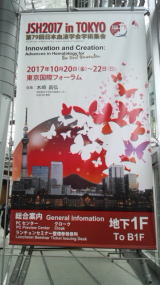
Medical/Healthcare English Communication
October’s classes were held as follows; 10/07 (Sat) Tokyo-Nighttime, 10/11(Wed)
Tokyo-Daytime, 10/18 (Wed) Yokohama-Morning, and 10/29 (Sun) Sapporo-Morning
& Evening. As for October’s themes, Lesson 10 was "An inpatient
with diabetes” , and Chapter 10 was “The Endocrine System”. One of the
warm-up Listening topics was “Laughter is the best medicine”. It was a
similar concept to the previous news article we used last month, which
was a prospective cancer treatment “Medics put Jest to the test.” Laughter
strengthens the immune system, improves the mood, reduces pain, and protects
people from the damaging effects of stress.
The other topic was "sleep". The endocrine system and sleep have
a close relationship. The melatonin is a substance formed by the mammalian
pineal gland. It is involved in circadian rhythms. Meanwhile, three American
scientists have won this year's Nobel Prize in Physiology or Medicine for
their discoveries about the inner workings of biological clocks in living
things. The Nobel Committee says their discoveries explain how plants,
animals, and humans adapt their internal rhythms to match up with the Earth's
turns. Inner clocks regulate behavior, hormone levels, sleep, body temperature,
and metabolism. For example, having an inner clock that's constantly out
of rhythm is associated with increased risk for various diseases.
Sports & Volunteer Activities English Communication
October’s classes were held as follows; 10/3 (Tue) Tokyo-Morning, 10/5
(Thu) Tokyo-Nighttime, 10/26 (Thu) Fujisawa-Nighttime, 10/29 (Sun) Sapporo-Afternoon.
October’s themes were “Track and Field” among Sports Club Activities and
“Taking Vital Signs” as the first lesson of Complementary and Alternative
Medicine (CAM). We practiced substitution and role-play as usual. Warm-up
listening topics were as follows; “Japanese noodles (udon and soba)”, “ramen”,
and “the country with the most Olympic marathon medals”.
[Sapporo MELSA]
As for Sapporo MELSA, the bad weather led to fewer participants in the past few months. Thanks to the beautiful weather in September, however, the number of participants is more likely to be increasing. We will enjoy learning together again. Sapporo city has already been filled with autumn season. You can enjoy a lively and brisk atmosphere in the underground shopping center just like in Tokyo. Meanwhile, you can see the vast expanse of the sky while walking along the sidewalk and feel a refreshing air of autumn there.
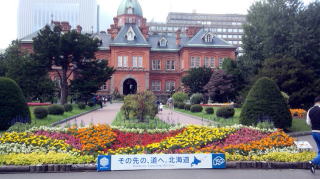
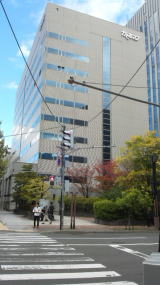
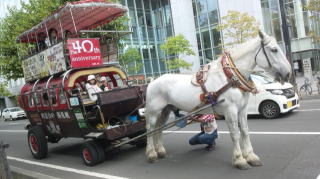
Medical/Healthcare English Communication
September’s classes were held as follows; 9/22 (Sat) Tokyo-Nighttime, 9/13(Wed) Tokyo-Daytime, 9/20 (Wed) Yokohama-MELSA, 9/24 (Sun) Sapporo-MELSA.
Sports & Volunteer Activities English Communication
September’s classes were held as follows; 9/5 (Tue) Tokyo-Daytime, 9/14 (Thu) Tokyo-Nighttime, 9/24 (Sun) Sapporo-MELSA, 9/28 (Thu) Shonan-MELSA Fujisawa. September’ themes were “Watching sports and Supporting” and “ER (emergency room) and AED (automated external defibrillator)”. Warm-up Listening themes were as follows; “Viewing the moon”, ”Figure Skater Mao Asada Retires”. and ”Golfer Ai Miyazato Says Thanks”. The additional dialogue practice was about “What kinds of things do sports volunteers do?” Then the answer was as follows; They help the competition by assisting the athletes and event organizers, and also by supporting the visitors.
2017-August
Medical/Healthcare English Communication
Tokyo-Daytime, Toky-Nighttime, Yokohama-MELSA, and Sapporo-MELSA classes were held on August 2 (Tue), 3 (Thu), 16 (Wed), and 20 (Sun), respectively. The themes were "Helping inpatietnts with paralysis" and "The Nervous System". Regarding paralysis, the warm-up listening topics were "Study to regenerate spinal cords with iPS cells" and "There's more hope now for people with spinal injuries".
Sports & Volunteer Activities English Communication
Tokyo-Morning, Tokyo-Nighttime, Sapporo-MELSA, and Shonan-MELSA Fujisawa classes were held on August 8 (Tue), 10 (Thu), 20 (Sun) ,and 31 (Thu), respectively. The theme of sports was "Sports club and Circle". The theme of healthcare was "physical examinations, treatments, accounting". The warm-up listening topics were "Ancestor Rememberance Festival", "Recruiting Athletes for Tokyo 2020", "various after-school activities", and "New guidelines call for earlier English Learning".
2017-July
Medical/Healthcare English Communication
Tokyo-Daytime, Toky-Nighttime, Yokohama-MELSA, and Sapporo-MELSA classes were held on July 4 (Tue), 1 (Sat), 19 (Wed), and 23 (Sun), respectively. The theme in the first period was "Helping inpatietnts with their daily life". The second period theme was "The Urinary System". Regarding the urinary system, we had three kinds of warm-up listening topics, including "Marathon and Dehydration", "Heatstroke precaution for Tokyo 2020", and the dialogue between Dr. and a patient about "Renal Stone" as one of the diseases in uropaty.
Sports & Volunteer Activities English Communication
Tokyo-Morning, Tokyo-Nighttime, Sapporo-MELSA, and Shonan-MELSA Fujisawa classes were held on July 11 (Tue), 6 (Thu), 23 (Sun) ,and 27 (Thu), respectively. The theme of sports was "A variety of sports; to ask and/or talk about one's favorite sports". The theme of healthcare was "Giving direction in the hospital; how to explain directions and/or locations". We practiced that using a map. And warm-up listening topics were as follows: "Star Festival in Japan" as a Japanese annual event, "about Nishikori's first Grand Slam Final", and "Heatstroke precaution for the 2020 Tokyo Olympics". The Tokyo games are scheduled on late July and early August of 2020. Authorities advise us to beware of heatstroke because hundreds of people across Japan are taken to hospitals on especially hot days during this season every year.
2017-June
Medical/Healthcare English Communication
Tokyo-Daytime, Toky-Nighttime, Yokohama-MELSA, and Sapporo-MELSA classes were held on June 9 (Fri), 1 (Thu), 21 (Wed) and 25 (Sun), respectively. Themes were "hospitalization, showing the ward" and " The Respiratory System". One of the warm-up listening practice topics was about "Pollution kills nealy 2 million children a year", according to the World Health Organization (WHO). The other one was about "observation of breathing" for an inpatient.
Sports & Volunteer Activities English Communication
Tokyo-Morning, Tokyo-Nighttime, Shonan-MELSA Fujisawa and Sapporo-MELSA classes were held on June 6 (Tue), 10 (Sat), 25 (Ssun) , and 29 (Thu), respectively. The first theme of sports was "a break the ice": to start with asking "Which sport do you like the best?". The second theme was a dialogue about healthcare communication between a patient and a receptionist at the counter in the hospital. And we also used a few warm-up listening topics, such as "Tokyo Olympics", "Sports Festival", and "Tokyo Olympic Emblems Scrapped".
As you know, the first Tokyo Olympics was held in 1964. It was a symbol of Japan's re-development and acceptance as a member of the international community after it was defeated in the Second World War. Regarding Sports Festival in Japan, these events are held at most schools and neighborhood communities, and generally held near the national holiday called "Sports Day" in October. The purpose is community and team building.
2017-May
Medical/Healthcare English Communication
Tokyo-Daytime, Toky-Nighttime, Yokohama-MELSA, and Sapporo-MELSA classes were held on May 9 (Tue), 13 (Sat), 24 (Wed) and 28 (Sun), respectively. The main themes were “”The Emergency Medical-Care System" and "Circulatory System and AED". The warm-up listening practice was about "Dialogue between a doctor and a patient with heart problem" and "At a disaster site: Dialogue between a nurse and an American male victim with a minor injury".
Sports & Volunteer Activities English Communication
Tokyo-Morning, Tokyo-Nighttime, Shonan-MELSA Fujisawa and Sapporo-MELSA classes were held on May 16 (Tue), 18 (Thu), 25 (Thu) , and 28 (Sun), respectively. The themes were "About your favorite food, drinks, and others” and "Disaster Nursing”. This month, one of the warm-up listening topics was about Japanese national holiday "Children's Day" and the other one was about
2017-April
Medical/Healthcare English Communication
Tokyo-Daytime, Toky-Nighttime, Yokohama-MELSA, and Sapporo-MELSA classes were held on April 2 (Tue), 13 (Thu), 19 (Wed) and 23 (Sun), respectively. The main themes were “Complete physical Examination” and “The Blood". The topics of warm-up listening were "Taking a cold shower?" and "Having a nice and long soak in a hot bath!". In Sapporo-MELSA, we also studied about the news "Artificial Intelligence (AI), what is called Watson, Saves life". Watson conducted that the patient had another type of blood cancer and proposed a different anticancer drug. On TV news, doctors say AI technology is opening a new horizon in the field of medicine, beyound human intellect.
Sports & Volunteer Activities English Communication
Tokyo-Morning, Tokyo-Nighttime, Sapporo-MELSA, and Shonan-MELSA Fujisawa classes were held on April 12 (Wed), 6 (Thu), 23 (Sun), and 27 (Thu), respectively. The themes were "Small talk to fill in the time” and "Occupational Health Nursing (OHN)”. The practice of OHN is based on the healthcare in working environment. In Japan, the Ministry of Health, Labor and Welfare has started focusing on working hours as the issue of law since a Japanese young female worker, who worked at one of the advertising giants, committed suicide in December 2015 due to a crushing workload. Other topics for warm-up listening were Japan's seasonal events such as "Viewing the Cherry Blossoms" and
2017-March
2017 SAPPORO ASIAN WINTER GAMES” was held in Sapporo and Obihiro from February 19 to 26. Some of the MELSA participants played an important role as a sports volunteer in that event. They also helped a lot to open Sapporo MELSA. We are deeply grateful to their kindness and cooperation.
Medical/Healthcare English Communication
Toky Nighttime, Tokyo Daytime, Yokohama MELSA and Sapporo classes were held on March 2 (Thu), 8 (Wed), 15 (Wed) and 20 (Mon), respectively. The main themes were “Colonoscopy” and “The Digestive System". The topics of warm-up listening were "longevity" and "for maintaining your teeth healthy...".
Sports & Volunteer Activities English Communication
Tokyo Morning, Tokyo Nighttime and Sapporo classes were held on March 7 (Tue), 16 (Thu) and 20 (Mon), respectively. The themes were "introducing club activities etc. and sports for fun” and "regional medical service, home visits and care”. The warm-up listening topics were "Valentine and White Days",
2017-February
Medical/Healthcare English Communication
Tokyo Day-time, Tokyo Night-time and Yokohama MELSA classes were held on February 2 (Thu), 7 (Thu) and 15 (Wed), respectively. The main themes were “At the accounting counter” and “The Skeletal and Muscular System.” The topic for warm-up listening was “Would you participate in 20-year medical study?” The aim of this project is to find possible causes of diseases. The medical experiment will track a multitude of things, including diet, exercise, sleep, genetics, medical records, personality tests, credit card spending, GPS location data and blood tests. This article is very useful for us to review lots of medical terms we have learned.
Sports & Volunteer Activities English Communication
On February 9 (Thu) and 14 (Thu), Morning class and nighttime classe were held, respectively. The themes were “About volunteer activities” and “About a burn with hot oil while cooking.” One of the topics for warm-up listening was a traditional Japanese event “Setsubun” or “Bean Throwing DAY.” The other topics were "Are you happy, and would you like to be happier?" and about a very recent medical term “Cyberchondoria.”
2017-January
Medical/Healthcare English Communication
Day-time MELSA, Night-time MELSA, and Yokohama MELSA were held on January 6 (Fri), 14 (Sat), and 18 (Wed), respectively. Especially, we had 24 participants in the night class. Most of them were new comers and they were really enthusiastic to learn medical English. For this year, MELSA materials have been freshly innovated for participants. A warm-up listening topic was “Matcha” as a suitable theme, like a tea ceremony for New Year. We practiced reading, shadowing, and memorization of dialogs for Role-Play among 3 people (doctor/nurse/receptionist, patient, and interpreter).
Sports & Volunteer Activities English Communication
Tokyo Morning and Tokyo nighttime classes were held on January 10 (Tue) and 19 (Thu), respectively. The topic of warm-up listening were about "the New Year Holidays" as an annual event in Japan called “O-shogatsu”and “Everyone wants to learn something, but …”.
2016 MELSA Lesson Reports
We will use materials and CDs to learn about topics from various fields regarding not only medical and/or healthcare information but also traditional Japanese main events, sports, and Olympics/Paralympics each month. We hope it helps you to get more enjoyment for daily life, for forming relationship with people around you and any other situations.
[2016 New Additional Items of MELSA Lesson]
We have already heard of the Zica fever, dengue fever, and Ebola infections in the news. Recently, an international lecture on "Travel Medicine" was held in Japan. As MELSA aims at focusing on current worldwide issues, MELSA will incorporate these latest topics discussed in the news and lectures into our lessons. We hope that these issues can correspond to everyone’s interests. In order to be a part of global society, we will try to select current topics about healthcare in the world.
2016-December
Medical/Healthcare English
At the end of this year, we studied about “Pharmacy & Medications”, including OTC, prescription medicine and instructions of medication. And then we reviewed almost all about the scenes and questionnaire related to “out-patient & first visit”. We also used CDs for intensive learning terminology, words and phrases in medical/healthcare English as well as role-play practice exercises for communication.
Sports and Volunteer Activities English: Themes were “workplace, commute, transportation and designating area” and “diseases & injuries”. Warm-up listening practices were as follows; “Christmas”, “Decision” of giving up smoking, and “the conversation between a landlady and a new tenant”.
2016-November
Medical/Healthcare English:We studied about two kinds of subject, "Accounting, Paying the bill at the cashier's counter", including Japanese National Health Insurance system, and "Urinary System and diseases related to urinary tracts". For a warm-up listening practice, we used the article "Weight training, bulking up muscles and brain function" and foreign news "Cleaning up Agent Orange in Vietnam". Interestingly, the article said that lifting weights is better for losing weights than cardio exercise. We also learned that high levels of dioxin are still detected there more than 40 years after the war ended.
Sports and Volunteer Activities English:The first subject was about "How to express our emotions", such as feeling happy, angry, sad, and sorry. The second was about "Parts of the body, Organs". In addition, for a warm-up listening practice, we used the materials about "Shiti-go-san, November 15", "Shrines and Temples", and one of the natural disasters, "Earthquakes in Japan".
2016-October
Medical/Healthcare English:The first subject was about Preoperative Management for Operation (Explaining before/after Surgery, Day of the operation). The second one was about Musculoskeletal system, Orthopedics, and related diseases such as backache, knee ache (osteoarthritis OA). For a warm-up listening practice, we used two kinds of material, including "Anesthesia" and " A Patient with osteoporosis at a dental clinic". We focused on listening to the general questions an anesthesiologist usually asks before an operation, and also listening to useful advice and recommendation from an internist or a dentist regarding osteoporosis we have to know about.
Sports and Volunteer Activities English:
Main subjects were " How to praise, How to apologize" and " Illness/Desease, Test, and Treatment". We used several topics for a warm-up listening practice, including "Sports Festival" as one of the Japanese evens in autumn, "Healthier Choices for Diners, and "Rio Olympics with Cultural and Environmental Themes" with a surprise cameo from Japanese Prime Minister Shinzo Abe dressed as Super Mario. In addition, we read an article, "Adults Who Volunteer Are Healthier Than Those Who Do Not". This topic may encourage us to make more efforts and enjoy doing volunteer activities all together.
2016-September
Medical/Healthcare English:The first subject was about "Medical examinations and Tests", including names of testing and explaining the test/treatment/procedure". The second one was about "Digestive system", including diseases such as abdominal pain and diarrhea. For a warm-up listening practice, we used two topics, "A Japanese actor and his stomach cancer" and "A new method of radiotherapy: pinpoint cancer attack".
Sports and Volunteer Activities English:
Warm-up listening practices were "Viewing the Full Moon" as a Japanese event in September, "Tropical storm or Typhoon", and "Heatstroke precautions for Tokyo 2020" related to sever weather during the middle of summer in Japan.
2016-August
Medical/Healthcare English:The first subject was about"Measurement of Vital Signs" and the second was about "Ophthalmology". The themes for a warm-up listening practice were "Most common Complaints at the ophthalmological clinic", and "The 1st iPS Transplant to treat a woman suffering from age-related maculardegeneration". This disease causes a progressive decline in vision. iPS stands for induced pluripotent stem cells.
Sports and Volunteer Activities English:
Warm-up listening practices were "O-Bon, Ancestor Remembrance Festival" as one of Japanese annual events, "Corcovado, a World Heritage Site", and "Zika fever" related to the Olympics in Brazil.
2016-July
Medical/Healthcare English:The main subjects were as follows: a) Physical Examination (1) Calling a patient/Taking Measurements b) Sensory organs,? Dermatology, and diseases such as eczema and pediatric allergy. "Medical examination", "Examination of the cranial nerves" and "Hair loss Mechanism found" were the themes for a warm-up listening practice.
Sports and Volunteer Activities English:
July:"Star Festival on July 7th" was one of the main themes in this month. We learned about the story of two stars compared to lovers based on a Chinese legend by listening to CD. Then we enjoyed learning how to communicate with our foreign guests at a Sushi restaurant, including the explanation of Japanese sake.
2016-June
Medical/Healthcare English:In the first class period, the subject was continued from the previous "Medical inquiries by doctors at the consultation room". Taking history (2) obstetrical past history, smoking, drinking and other lifestyle habits, etc. In the second class period, we learned about Pediatrics; a) Roseola Infantum b) Measles (Rubeola) c) Chickenpox (Varicella). At the beginnig of each class, we usually use a little time for a warm-up listening practice. The themes were about "Obesity" and "Anti-smoking campaign" .
Sports and Volunteer Activities English:
"School Clubs ( after school)", "The Rugby World Cup in England". In addition, things related to concussion and "Pocket Concussion Recognition Tool”.
2016-May
Medical/Healthcare English:The first subject was about "Medical inquiries by doctors at the consultation room". Taking history (1) past history, family history, allergies, etc. We also learned about Psychosomatic internal medicine/ Psychiatry as the second subject; a) School Refusal b) Depression and Insomnia. Closely related to this month's subjects, "Meditation" and "A lack of sleep" were the themes for a warm-up listening practice.
Sports and Volunteer Activities English:
"Children’s Day" as one of the Japanese traditional events and national holidays and "Kyoto" as an old capital of Japan.
2016-April
Medical/Healthcare English:We learned about "The immune System" and "Blood". From the extensive point of the human body function, it is important for us to study these two themes together because of their very close relationships between blood cells and antigen-anibody reaction. Antibodies are found in the blood and body fluids. After binding antigen, some antibodies may fix, complement, bind to surface receptors on immune cells, and in some cases may neutralize microorganisms.
Sports and Volunteer Activities English:
The special topics for listening and reading practice were about "Cherry blossom viewing", "Tokyo Olympics"、and "the bullet train".
2016-March
Medical/Healthcare English: "The reproductive System" and "The Ebola". The theme was especially about pregnancy and infectious diseases. You have probably heard in the news and watched on TV about infectious diseases such as "Zika", "Dengue" and "Ebola". So, in March, we focused on learning about this frightening disease, Ebola in English. We also got the information about "Travel Medicine" in Japanese. We hope it helps you to study more by yourself at home.
Sports and Volunteer Activities English: "The girls' [dolls'] festival" and "The spirit of martial art".
2016-February
Medical/Healthcare English: "The Nervous system" and "The Brain". We provided the key words and phrases as well as basic information to understand the article about the brain and nerves in English. We introduced the useful CD and YouTube video, using several minutes for each.
Sports and Volunteer Activities English:
" The marathon" and "The Olympic emblem"
2016-January
Medical/Healthcare English:"The Cells" and "The influenza (the flu)".
Sports and Volunteer Activities English:"About Japan" and "The Acropolis in Athens"
2016 New Year Greetings from MELSA
2016 Happy New Year
Let us welcome the year which is new and fresh. What is your New Year resolution? Let us leave behind sadness, regrets and painful moments and have a new start full of joy this year.
It is never too late to start again but yes it is always very early when one gives up.
Please join us and learn together.
The 2020 Tokyo Summer Olympics/Paralympics
Tokyo will host the 32nd Summer Olympic/Paralympic games in 2020.
Recently the number of visitors to Japan has been increasing even before the opening of the Games. We may have an opportunity to show someone around or do some volunteer activities here and there. If we talk someone from another country, we never know what topics will come up. However, the topics that will almost always come up are more likely to be Japan itself or ourselves. If we know what we are going to talk about, we can easily prepare by learning new words and phrases in advance. Therefore, MELSA prepared the special new program for people planning to take part in volunteer activities. Eventually,"Sports & Volunteer English Conversation" class successfully started last September. While studying about Japan itself, we will not only be able to improve our English but also share our information and experiences each other.
Please join us and learn together with MELSA from now on!!
Japanese Hospitality
It is often said that the Japanese people are "polite." This characteristic is probably rooted in the spirit of omotenashi --- a Japanes hospitality. When we go to shops or restaurants throughout Japan, the staff bow very politely to us. This kind of behavieor is the typical Japanes hospitality of being considerate to our guests or others.
MELSA Small Talk
A dictionary says that “small talk” is a polite conversation about ordinary or unimportant subjects, especially at social occasions. Small talk topics are usually the focus of our daily conversations. Sometimes small talk is more important for adults because we are not very comfortable with silence. So we are more likely to begin our conversation with small talk to strangers.
In addition, we can chat away with our friends about something. We can also enjoy a long chat over a cup of coffee or a meal with them. Therefore, certain acceptable small talk topics such as sports, hobbies, work and food are very helpful for us when we meet someone from abroad for the first time until we get to know each other better. Please join us and learn together.
Newcomers are always welcome to the "Sports & Volunteer English Conversation" class.
Let’s start with MELSA for the 2020 Olympic/Paralympic games!
MELSA's Materials for Medical/Healthcare English
MELSA's materials for medical/healthcare English have a total of 12 sections in a year.
It will enable you to conduct a well-balanced study of dialogue patterns and expressions as you imagine the situations in which medical/healthcare words are used both in Japan and overseas.
Regarding anatomy and physiology, each section contains basic overview about one of the organ systems divided into 11 groups in a human body. You can study one section in a month. If you are not confident about cells as a basic component unit of the body, then please start with Section 1. For Section 2 through 12, you do not have to proceed through them in order. However, you can start with the sections you want study soon or that interest you.
The people (patients) who appear in the conversations (dialogues) have trouble because they do not understand how to deal with their conditions. They will try to communicate in different languages. Empathize with them and observe them closely.
In order to use medical/healthcare words precisely and proficiently, you must study medical terminology as well as grammar, sentence patterns and expressions.
Please do basic practice as much as possible and keep practicing as long as it takes to get good at speaking.
MELSA Lesson Reports
Medical/Healthcare & Sports/Volunteer Activities English
2016 MELSA lessons
MELSA lessons have just started. The number of participants has been increasing gradually.
Yokohama-MELSA lesson on January 20 was helped by a volunteer lecturer, Dr. Ward. Thank you very much.
Special thanks to all MELSA participants in 2015
Thank you very much for your participation in MELSA lessons throughout the year in 2015. We have succcessfully finished Medical/Healthcare Daytime-MELSA, Nighttime-MELSA, and Yokoham-MELSA lessons.
And also finished Sports/Volunteer activities English lessons with great pleasure.
We, all MELSA staff are looking forward to seeing you again next year.
The first Yokohama-MELSA lesson was successfully finished.
The first Yokohama-MELSA lesson was held on March 25th. We had a great time with Dr. Ward. She is a doctor of OB-GYN (obstetrics and gynecology). The MELSA program of March is reproductive system. It was a perfect day for us to learn with her. Thank you very much for her generous cooperation to help MELSA activities despite her very busy schedule.
We had a special seminor on March 11th.
We invited Mr. Uchida, an acupuncturist as MELSA volunteer lecturer in Daytime-MELSA lesson.
He gave us an interesting and informative leture about complementary and alternative medicine [CAM].
Why does acupuncture work?
―Acupuncture is simple, safe, effective and sustainable healthcare.
Our health depends on the body’s energy flow, moving in a smooth and balanced way through channels throughout the body. The flow can be disturbed by physical, mental, emotional factors as well as lifestyle and weather conditions.
Acupuncture can stimulate the body’s own healing response and help restore its natural balance, and it focuses on improving the overall well-being of the patient, rather than the isolated treatment of specific symptoms.
Meridians and collaterals
Meridians and collaterals (Jing-Luo) are pathways that transport Qi, Blood, and Fluid and connect the internal Zang-fu organs with the surface and other part of the body. The twelve regular meridians are based on three factors, which are hand or foot, yin or yang, and zang or fu organs.
Physiological functions of meridians:
Circulating Qi, Blood and Fluid and coordinating Yin and Yang,
Communicating the exterior with the interior, connecting with viscera,
Circulating Qi, Blood and Fluid and coordinating Yin and Yang,
Resisting evil and manifesting symptoms and signs of diseases,
Transmitting sensation and regulating the deficiency and excess,
Mr. Uchida brought a model of the human body for our understanding his
lecture well.
His name is "TARO". Here are his pictures.


2015 New Year Greetings!
May peace, happiness, good health and continued success be yours every
day throughout the new year.
MELSA schedule for January, February and March in 2015.
Please make sure of each date, time and venue every month because the
opening hour will be changed depending on the venue. (December 9th)
Now, we are "NPO MELSA"!
We have got the approval documment as a "Non-Profit Organization
Medical English Learning Support Association" from the metropolitan
goverment office. We MELSA submitted the application in June this year.
We have been making efforts to establish the NPO MELSA for a long time. And
We will also try to do our best from now on for better contribution in
a society. (October 29th)
Many apologies
We are very sorry that we could not answer your Inquiry and/or Application
because Yahoo mail service was not available from September 30th 9:20
a.m. until October 4th at 6:57 a.m. Just in case anyone sent a message
to our MELSA office during that period, please send the same one to us
again. Thank for your understanding. (October 10th)
The celebration of the first anniversary of the founding of MELSA
Thank you very much for participating in MELSA lessons, as well as your support and understanding.
We will try to do our best to contribute to your opportunity and convenience of studying medical English
in the future. (September 18th)
Short notice
We reluctantly decided to cancel the daytime MELSA lesson on June 4 and
the nighttime MELSA lesson
on May 27 due to a very urgent personal matter. We are very sorry that
we had given an only short notice to some of the MELSA members beforehand. The opening schedule and other information might change depending on the
situation. We apologize for your inconvenience and appreciate your understanding. (June 17th)
このページの先頭へ
Medical English Learning Support Association (MELSA)NPO MELSA Office:
e-mail: melsa@outlook.jp
Non-Profit Organization
Medical English Learning Support Association
Inquiry/Application:Click here